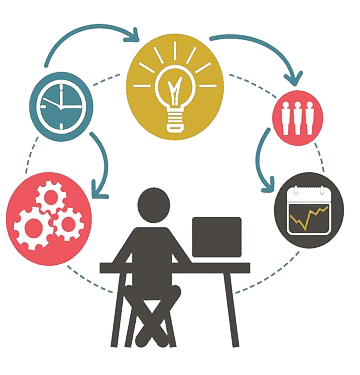The rapid advancement of Artificial Intelligence (AI) is transforming Online Education in India, making learning more interactive, efficient, and accessible. AI is revolutionizing how students engage with educational content, how teachers deliver lessons, and how institutions manage their systems. As more students and schools embrace Virtual School Education India, AI is becoming an essential tool for personalized learning, automated assessments, and real-time student support.
AI’s Impact on Virtual School Education in India
AI is reshaping Virtual School Education India by providing advanced learning tools that enhance the student experience. With AI-driven analytics and adaptive learning platforms, students receive tailored content based on their strengths and weaknesses. Here’s how AI is contributing to virtual schooling:
1. Personalized Learning
Traditional classrooms follow a one-size-fits-all approach, which may not cater to every student’s unique learning pace. AI-driven platforms analyze student performance and adjust lesson plans accordingly. This ensures that students grasp concepts at their own speed, increasing retention and comprehension.
2. AI-Powered Tutoring
AI-driven chatbots and virtual tutors are providing 24/7 assistance to students. These AI tutors help in answering queries, providing explanations, and even suggesting additional resources based on individual learning progress. This feature is especially beneficial for students who need extra help outside traditional school hours.
3. Automated Assessments and Feedback
AI-powered evaluation systems can assess student performance in real-time, providing instant feedback and identifying areas of improvement. This automation helps educators save time while ensuring accurate and unbiased assessments.
4. Smart Content Creation
AI tools are assisting in developing educational content, including interactive videos, quizzes, and simulations. These AI-generated materials help create engaging and immersive learning experiences, making virtual schooling more effective.
AI’s Role in Top Online Schools in India
As the demand for online learning grows, the Top Online Schools in India are leveraging AI to enhance their teaching methodologies. Here are some key areas where AI is making a difference:
1. AI-Based Student Monitoring
Online schools use AI-powered tools to monitor student attendance, participation, and progress. AI can detect disengagement and alert educators to intervene, ensuring that students stay on track.
2. Enhanced Administrative Processes
AI is streamlining administrative tasks such as admissions, scheduling, and communication. Chatbots help in answering student queries related to courses, fees, and deadlines, reducing the workload on administrative staff.
3. AI-Enabled Adaptive Learning Platforms
Adaptive learning platforms use AI to tailor study plans for students. These platforms analyze student behavior, performance, and engagement levels to provide customized learning paths, ensuring a more effective educational experience.
4. AI-Powered Exam Proctoring
With the rise of online examinations, AI-powered proctoring tools help maintain integrity. These tools detect suspicious behavior, prevent cheating, and ensure fairness in assessments, making online exams as credible as traditional ones.
The Future of AI in Online Education in India
The future of Online Education in India is closely linked with AI innovations. As technology advances, AI will continue to enhance accessibility, inclusivity, and effectiveness in education. Here are some upcoming AI-driven trends:
1. AI and Gamification
Gamification in education is gaining popularity, and AI is playing a crucial role in making learning more interactive. AI-driven games and simulations make complex concepts easier to understand, increasing student engagement.
2. AI in Special Education
AI tools are helping students with disabilities by providing personalized assistance, speech-to-text applications, and AI-driven sign language interpreters. This ensures that education is accessible to all students, regardless of their abilities.
3. Voice Assistants for Learning
AI-powered voice assistants like Alexa and Google Assistant are being integrated into learning platforms. Students can ask questions, receive explanations, and access study materials through voice commands, making learning more convenient.
4. Predictive Analytics for Student Success
AI-driven predictive analytics can help educators identify students at risk of falling behind. By analyzing patterns and performance, AI can suggest interventions to ensure student success and retention.
Conclusion
AI is playing a transformative role in Online Education in India, offering students and educators smarter, more efficient ways to engage with learning. The integration of AI in Virtual School Education India and Top Online Schools in India is making education more personalized, accessible, and effective. As AI continues to evolve, its impact on online education will only grow, shaping the future of learning in India.




![{"type":"elementor","siteurl":"https://edumentonline.com/wp-json/","elements":[{"id":"2f170da","elType":"widget","isInner":false,"isLocked":false,"settings":{"image":{"url":"","id":"","size":""},"title_text":"1. CBSE Dubai Online School","description_text":"Edument Knowledge Hub provides a strong CBSE online curriculum catered for students looking for top-notch education.","title_typography_typography":"custom","title_typography_font_size":{"unit":"px","size":22,"sizes":[]},"title_typography_font_weight":"600","description_color":"#181818","element_pack_widget_tooltip_text":"This is Tooltip","element_pack_widget_effect_transition_duration":"300","element_pack_widget_effect_transition_easing":"ease-out","text_align":"left","description_typography_typography":"custom","description_typography_line_height":{"unit":"px","size":24,"sizes":[]},"__globals__":{"title_color":"globals/colors?id=secondary"},"thumbnail_size":"full","thumbnail_custom_dimension":{"width":"","height":""},"link":{"url":"","is_external":"","nofollow":"","custom_attributes":""},"title_size":"h3","position":"top","position_tablet":"","position_mobile":"","content_vertical_alignment":"top","content_vertical_alignment_tablet":"","content_vertical_alignment_mobile":"","text_align_tablet":"","text_align_mobile":"","image_space":{"unit":"px","size":15,"sizes":[]},"image_space_tablet":{"unit":"px","size":"","sizes":[]},"image_space_mobile":{"unit":"px","size":"","sizes":[]},"title_bottom_space":{"unit":"px","size":"","sizes":[]},"title_bottom_space_tablet":{"unit":"px","size":"","sizes":[]},"title_bottom_space_mobile":{"unit":"px","size":"","sizes":[]},"image_size":{"unit":"%","size":30,"sizes":[]},"image_size_tablet":{"unit":"%","size":"","sizes":[]},"image_size_mobile":{"unit":"%","size":"","sizes":[]},"image_border_border":"","image_border_width":{"unit":"px","top":"","right":"","bottom":"","left":"","isLinked":true},"image_border_width_tablet":{"unit":"px","top":"","right":"","bottom":"","left":"","isLinked":true},"image_border_width_mobile":{"unit":"px","top":"","right":"","bottom":"","left":"","isLinked":true},"image_border_color":"","image_border_radius":{"unit":"px","size":"","sizes":[]},"image_border_radius_tablet":{"unit":"px","size":"","sizes":[]},"image_border_radius_mobile":{"unit":"px","size":"","sizes":[]},"css_filters_css_filter":"","css_filters_blur":{"unit":"px","size":0,"sizes":[]},"css_filters_brightness":{"unit":"px","size":100,"sizes":[]},"css_filters_contrast":{"unit":"px","size":100,"sizes":[]},"css_filters_saturate":{"unit":"px","size":100,"sizes":[]},"css_filters_hue":{"unit":"px","size":0,"sizes":[]},"image_opacity":{"unit":"px","size":"","sizes":[]},"css_filters_hover_css_filter":"","css_filters_hover_blur":{"unit":"px","size":0,"sizes":[]},"css_filters_hover_brightness":{"unit":"px","size":100,"sizes":[]},"css_filters_hover_contrast":{"unit":"px","size":100,"sizes":[]},"css_filters_hover_saturate":{"unit":"px","size":100,"sizes":[]},"css_filters_hover_hue":{"unit":"px","size":0,"sizes":[]},"image_opacity_hover":{"unit":"px","size":"","sizes":[]},"background_hover_transition":{"unit":"px","size":0.3,"sizes":[]},"hover_animation":"","title_color":"","title_typography_font_family":"","title_typography_font_size_tablet":{"unit":"px","size":"","sizes":[]},"title_typography_font_size_mobile":{"unit":"px","size":"","sizes":[]},"title_typography_text_transform":"","title_typography_font_style":"","title_typography_text_decoration":"","title_typography_line_height":{"unit":"px","size":"","sizes":[]},"title_typography_line_height_tablet":{"unit":"em","size":"","sizes":[]},"title_typography_line_height_mobile":{"unit":"em","size":"","sizes":[]},"title_typography_letter_spacing":{"unit":"px","size":"","sizes":[]},"title_typography_letter_spacing_tablet":{"unit":"px","size":"","sizes":[]},"title_typography_letter_spacing_mobile":{"unit":"px","size":"","sizes":[]},"title_typography_word_spacing":{"unit":"px","size":"","sizes":[]},"title_typography_word_spacing_tablet":{"unit":"em","size":"","sizes":[]},"title_typography_word_spacing_mobile":{"unit":"em","size":"","sizes":[]},"title_stroke_text_stroke_type":"","title_stroke_text_stroke":{"unit":"px","size":"","sizes":[]},"title_stroke_text_stroke_tablet":{"unit":"px","size":"","sizes":[]},"title_stroke_text_stroke_mobile":{"unit":"px","size":"","sizes":[]},"title_stroke_stroke_color":"#000","title_shadow_text_shadow_type":"","title_shadow_text_shadow":{"horizontal":0,"vertical":0,"blur":10,"color":"rgba(0,0,0,0.3)"},"description_typography_font_family":"","description_typography_font_size":{"unit":"px","size":"","sizes":[]},"description_typography_font_size_tablet":{"unit":"px","size":"","sizes":[]},"description_typography_font_size_mobile":{"unit":"px","size":"","sizes":[]},"description_typography_font_weight":"","description_typography_text_transform":"","description_typography_font_style":"","description_typography_text_decoration":"","description_typography_line_height_tablet":{"unit":"em","size":"","sizes":[]},"description_typography_line_height_mobile":{"unit":"em","size":"","sizes":[]},"description_typography_letter_spacing":{"unit":"px","size":"","sizes":[]},"description_typography_letter_spacing_tablet":{"unit":"px","size":"","sizes":[]},"description_typography_letter_spacing_mobile":{"unit":"px","size":"","sizes":[]},"description_typography_word_spacing":{"unit":"px","size":"","sizes":[]},"description_typography_word_spacing_tablet":{"unit":"em","size":"","sizes":[]},"description_typography_word_spacing_mobile":{"unit":"em","size":"","sizes":[]},"description_shadow_text_shadow_type":"","description_shadow_text_shadow":{"horizontal":0,"vertical":0,"blur":10,"color":"rgba(0,0,0,0.3)"},"_title":"","_margin":{"unit":"px","top":"","right":"","bottom":"","left":"","isLinked":true},"_margin_tablet":{"unit":"px","top":"","right":"","bottom":"","left":"","isLinked":true},"_margin_mobile":{"unit":"px","top":"","right":"","bottom":"","left":"","isLinked":true},"_padding":{"unit":"px","top":"","right":"","bottom":"","left":"","isLinked":true},"_padding_tablet":{"unit":"px","top":"","right":"","bottom":"","left":"","isLinked":true},"_padding_mobile":{"unit":"px","top":"","right":"","bottom":"","left":"","isLinked":true},"_element_width":"","_element_width_tablet":"","_element_width_mobile":"","_element_custom_width":{"unit":"%","size":"","sizes":[]},"_element_custom_width_tablet":{"unit":"px","size":"","sizes":[]},"_element_custom_width_mobile":{"unit":"px","size":"","sizes":[]},"_flex_align_self":"","_flex_align_self_tablet":"","_flex_align_self_mobile":"","_flex_order":"","_flex_order_tablet":"","_flex_order_mobile":"","_flex_order_custom":"","_flex_order_custom_tablet":"","_flex_order_custom_mobile":"","_flex_size":"","_flex_size_tablet":"","_flex_size_mobile":"","_flex_grow":1,"_flex_grow_tablet":"","_flex_grow_mobile":"","_flex_shrink":1,"_flex_shrink_tablet":"","_flex_shrink_mobile":"","_element_vertical_align":"","_element_vertical_align_tablet":"","_element_vertical_align_mobile":"","_position":"","_offset_orientation_h":"start","_offset_x":{"unit":"px","size":0,"sizes":[]},"_offset_x_tablet":{"unit":"px","size":"","sizes":[]},"_offset_x_mobile":{"unit":"px","size":"","sizes":[]},"_offset_x_end":{"unit":"px","size":0,"sizes":[]},"_offset_x_end_tablet":{"unit":"px","size":"","sizes":[]},"_offset_x_end_mobile":{"unit":"px","size":"","sizes":[]},"_offset_orientation_v":"start","_offset_y":{"unit":"px","size":0,"sizes":[]},"_offset_y_tablet":{"unit":"px","size":"","sizes":[]},"_offset_y_mobile":{"unit":"px","size":"","sizes":[]},"_offset_y_end":{"unit":"px","size":0,"sizes":[]},"_offset_y_end_tablet":{"unit":"px","size":"","sizes":[]},"_offset_y_end_mobile":{"unit":"px","size":"","sizes":[]},"_z_index":"","_z_index_tablet":"","_z_index_mobile":"","_element_id":"","_css_classes":"","element_pack_widget_tooltip":"","element_pack_widget_tooltip_placement":"","element_pack_widget_tooltip_follow_cursor":"","element_pack_widget_tooltip_animation":"","element_pack_widget_tooltip_trigger":"","element_pack_widget_tooltip_custom_trigger":"","element_pack_widget_tooltip_x_offset":{"unit":"px","size":"","sizes":[]},"element_pack_widget_tooltip_y_offset":{"unit":"px","size":"","sizes":[]},"element_pack_widget_tooltip_arrow":"","element_pack_widget_tooltip_width":{"unit":"px","size":"","sizes":[]},"element_pack_widget_tooltip_width_tablet":{"unit":"px","size":"","sizes":[]},"element_pack_widget_tooltip_width_mobile":{"unit":"px","size":"","sizes":[]},"element_pack_widget_tooltip_color":"","element_pack_widget_tooltip_background_background":"","element_pack_widget_tooltip_background_color":"","element_pack_widget_tooltip_background_color_stop":{"unit":"%","size":0,"sizes":[]},"element_pack_widget_tooltip_background_color_stop_tablet":{"unit":"%"},"element_pack_widget_tooltip_background_color_stop_mobile":{"unit":"%"},"element_pack_widget_tooltip_background_color_b":"#f2295b","element_pack_widget_tooltip_background_color_b_stop":{"unit":"%","size":100,"sizes":[]},"element_pack_widget_tooltip_background_color_b_stop_tablet":{"unit":"%"},"element_pack_widget_tooltip_background_color_b_stop_mobile":{"unit":"%"},"element_pack_widget_tooltip_background_gradient_type":"linear","element_pack_widget_tooltip_background_gradient_angle":{"unit":"deg","size":180,"sizes":[]},"element_pack_widget_tooltip_background_gradient_angle_tablet":{"unit":"deg"},"element_pack_widget_tooltip_background_gradient_angle_mobile":{"unit":"deg"},"element_pack_widget_tooltip_background_gradient_position":"center center","element_pack_widget_tooltip_background_gradient_position_tablet":"","element_pack_widget_tooltip_background_gradient_position_mobile":"","element_pack_widget_tooltip_background_image":{"url":"","id":"","size":""},"element_pack_widget_tooltip_background_image_tablet":{"url":"","id":"","size":""},"element_pack_widget_tooltip_background_image_mobile":{"url":"","id":"","size":""},"element_pack_widget_tooltip_background_position":"","element_pack_widget_tooltip_background_position_tablet":"","element_pack_widget_tooltip_background_position_mobile":"","element_pack_widget_tooltip_background_xpos":{"unit":"px","size":0,"sizes":[]},"element_pack_widget_tooltip_background_xpos_tablet":{"unit":"px","size":0,"sizes":[]},"element_pack_widget_tooltip_background_xpos_mobile":{"unit":"px","size":0,"sizes":[]},"element_pack_widget_tooltip_background_ypos":{"unit":"px","size":0,"sizes":[]},"element_pack_widget_tooltip_background_ypos_tablet":{"unit":"px","size":0,"sizes":[]},"element_pack_widget_tooltip_background_ypos_mobile":{"unit":"px","size":0,"sizes":[]},"element_pack_widget_tooltip_background_attachment":"","element_pack_widget_tooltip_background_repeat":"","element_pack_widget_tooltip_background_repeat_tablet":"","element_pack_widget_tooltip_background_repeat_mobile":"","element_pack_widget_tooltip_background_size":"","element_pack_widget_tooltip_background_size_tablet":"","element_pack_widget_tooltip_background_size_mobile":"","element_pack_widget_tooltip_background_bg_width":{"unit":"%","size":100,"sizes":[]},"element_pack_widget_tooltip_background_bg_width_tablet":{"unit":"px","size":"","sizes":[]},"element_pack_widget_tooltip_background_bg_width_mobile":{"unit":"px","size":"","sizes":[]},"element_pack_widget_tooltip_background_video_link":"","element_pack_widget_tooltip_background_video_start":"","element_pack_widget_tooltip_background_video_end":"","element_pack_widget_tooltip_background_play_once":"","element_pack_widget_tooltip_background_play_on_mobile":"","element_pack_widget_tooltip_background_privacy_mode":"","element_pack_widget_tooltip_background_video_fallback":{"url":"","id":"","size":""},"element_pack_widget_tooltip_background_slideshow_gallery":[],"element_pack_widget_tooltip_background_slideshow_loop":"yes","element_pack_widget_tooltip_background_slideshow_slide_duration":5000,"element_pack_widget_tooltip_background_slideshow_slide_transition":"fade","element_pack_widget_tooltip_background_slideshow_transition_duration":500,"element_pack_widget_tooltip_background_slideshow_background_size":"","element_pack_widget_tooltip_background_slideshow_background_size_tablet":"","element_pack_widget_tooltip_background_slideshow_background_size_mobile":"","element_pack_widget_tooltip_background_slideshow_background_position":"","element_pack_widget_tooltip_background_slideshow_background_position_tablet":"","element_pack_widget_tooltip_background_slideshow_background_position_mobile":"","element_pack_widget_tooltip_background_slideshow_lazyload":"","element_pack_widget_tooltip_background_slideshow_ken_burns":"","element_pack_widget_tooltip_background_slideshow_ken_burns_zoom_direction":"in","element_pack_widget_tooltip_arrow_color":"","element_pack_widget_tooltip_padding":{"unit":"px","top":"","right":"","bottom":"","left":"","isLinked":true},"element_pack_widget_tooltip_padding_tablet":{"unit":"px","top":"","right":"","bottom":"","left":"","isLinked":true},"element_pack_widget_tooltip_padding_mobile":{"unit":"px","top":"","right":"","bottom":"","left":"","isLinked":true},"element_pack_widget_tooltip_border_border":"","element_pack_widget_tooltip_border_width":{"unit":"px","top":"","right":"","bottom":"","left":"","isLinked":true},"element_pack_widget_tooltip_border_width_tablet":{"unit":"px","top":"","right":"","bottom":"","left":"","isLinked":true},"element_pack_widget_tooltip_border_width_mobile":{"unit":"px","top":"","right":"","bottom":"","left":"","isLinked":true},"element_pack_widget_tooltip_border_color":"","element_pack_widget_tooltip_border_radius":{"unit":"px","top":"","right":"","bottom":"","left":"","isLinked":true},"element_pack_widget_tooltip_border_radius_tablet":{"unit":"px","top":"","right":"","bottom":"","left":"","isLinked":true},"element_pack_widget_tooltip_border_radius_mobile":{"unit":"px","top":"","right":"","bottom":"","left":"","isLinked":true},"element_pack_widget_tooltip_text_align":"center","element_pack_widget_tooltip_box_shadow_box_shadow_type":"","element_pack_widget_tooltip_box_shadow_box_shadow":{"horizontal":0,"vertical":0,"blur":10,"spread":0,"color":"rgba(0,0,0,0.5)"},"element_pack_widget_tooltip_box_shadow_box_shadow_position":" ","element_pack_widget_tooltip_typography_typography":"","element_pack_widget_tooltip_typography_font_family":"","element_pack_widget_tooltip_typography_font_size":{"unit":"px","size":"","sizes":[]},"element_pack_widget_tooltip_typography_font_size_tablet":{"unit":"px","size":"","sizes":[]},"element_pack_widget_tooltip_typography_font_size_mobile":{"unit":"px","size":"","sizes":[]},"element_pack_widget_tooltip_typography_font_weight":"","element_pack_widget_tooltip_typography_text_transform":"","element_pack_widget_tooltip_typography_font_style":"","element_pack_widget_tooltip_typography_text_decoration":"","element_pack_widget_tooltip_typography_line_height":{"unit":"px","size":"","sizes":[]},"element_pack_widget_tooltip_typography_line_height_tablet":{"unit":"em","size":"","sizes":[]},"element_pack_widget_tooltip_typography_line_height_mobile":{"unit":"em","size":"","sizes":[]},"element_pack_widget_tooltip_typography_letter_spacing":{"unit":"px","size":"","sizes":[]},"element_pack_widget_tooltip_typography_letter_spacing_tablet":{"unit":"px","size":"","sizes":[]},"element_pack_widget_tooltip_typography_letter_spacing_mobile":{"unit":"px","size":"","sizes":[]},"element_pack_widget_tooltip_typography_word_spacing":{"unit":"px","size":"","sizes":[]},"element_pack_widget_tooltip_typography_word_spacing_tablet":{"unit":"em","size":"","sizes":[]},"element_pack_widget_tooltip_typography_word_spacing_mobile":{"unit":"em","size":"","sizes":[]},"element_pack_wrapper_link":{"url":"","is_external":"","nofollow":"","custom_attributes":""},"ep_floating_effects_show":"","ep_floating_effects_translate_toggle":"","ep_floating_effects_translate_x":{"unit":"px","size":"","sizes":{"from":0,"to":0}},"ep_floating_effects_translate_y":{"unit":"px","size":"","sizes":{"from":0,"to":30}},"ep_floating_effects_translate_duration":{"unit":"px","size":1000,"sizes":[]},"ep_floating_effects_translate_delay":{"unit":"px","size":"","sizes":[]},"ep_floating_effects_rotate_toggle":"","ep_floating_effects_rotate_x":{"unit":"deg","size":"","sizes":{"from":0,"to":0}},"ep_floating_effects_rotate_y":{"unit":"deg","size":"","sizes":{"from":0,"to":0}},"ep_floating_effects_rotate_z":{"unit":"deg","size":"","sizes":{"from":0,"to":45}},"ep_floating_effects_rotate_infinite":"","ep_floating_effects_rotate_duration":{"unit":"px","size":2000,"sizes":[]},"ep_floating_effects_rotate_delay":{"unit":"px","size":"","sizes":[]},"ep_floating_effects_scale_toggle":"","ep_floating_effects_scale_x":{"unit":"px","size":"","sizes":{"from":1,"to":1.5}},"ep_floating_effects_scale_y":{"unit":"px","size":"","sizes":{"from":1,"to":1.5}},"ep_floating_effects_scale_duration":{"unit":"px","size":1000,"sizes":[]},"ep_floating_effects_scale_delay":{"unit":"px","size":"","sizes":[]},"ep_floating_effects_skew_toggle":"","ep_floating_effects_skew_x":{"unit":"px","size":"","sizes":{"from":1,"to":1.5}},"ep_floating_effects_skew_y":{"unit":"px","size":"","sizes":{"from":1,"to":1.5}},"ep_floating_effects_skew_duration":{"unit":"px","size":1000,"sizes":[]},"ep_floating_effects_skew_delay":{"unit":"px","size":"","sizes":[]},"ep_floating_effects_border_radius_toggle":"","ep_floating_effects_border_radius":{"unit":"px","size":"","sizes":{"from":0,"to":50}},"ep_floating_effects_border_radius_duration":{"unit":"px","size":1000,"sizes":[]},"ep_floating_effects_border_radius_delay":{"unit":"px","size":"","sizes":[]},"ep_floating_effects_opacity_toggle":"","ep_floating_effects_opacity_start":{"unit":"px","size":1,"sizes":[]},"ep_floating_effects_opacity_end":{"unit":"px","size":0,"sizes":[]},"ep_floating_effects_opacity_duration":{"unit":"px","size":1000,"sizes":[]},"ep_floating_effects_easing":"easeInOutQuad","motion_fx_motion_fx_scrolling":"","motion_fx_translateY_effect":"","motion_fx_translateY_direction":"","motion_fx_translateY_speed":{"unit":"px","size":4,"sizes":[]},"motion_fx_translateY_affectedRange":{"unit":"%","size":"","sizes":{"start":0,"end":100}},"motion_fx_translateX_effect":"","motion_fx_translateX_direction":"","motion_fx_translateX_speed":{"unit":"px","size":4,"sizes":[]},"motion_fx_translateX_affectedRange":{"unit":"%","size":"","sizes":{"start":0,"end":100}},"motion_fx_opacity_effect":"","motion_fx_opacity_direction":"out-in","motion_fx_opacity_level":{"unit":"px","size":10,"sizes":[]},"motion_fx_opacity_range":{"unit":"%","size":"","sizes":{"start":20,"end":80}},"motion_fx_blur_effect":"","motion_fx_blur_direction":"out-in","motion_fx_blur_level":{"unit":"px","size":7,"sizes":[]},"motion_fx_blur_range":{"unit":"%","size":"","sizes":{"start":20,"end":80}},"motion_fx_rotateZ_effect":"","motion_fx_rotateZ_direction":"","motion_fx_rotateZ_speed":{"unit":"px","size":1,"sizes":[]},"motion_fx_rotateZ_affectedRange":{"unit":"%","size":"","sizes":{"start":0,"end":100}},"motion_fx_scale_effect":"","motion_fx_scale_direction":"out-in","motion_fx_scale_speed":{"unit":"px","size":4,"sizes":[]},"motion_fx_scale_range":{"unit":"%","size":"","sizes":{"start":20,"end":80}},"motion_fx_transform_origin_x":"center","motion_fx_transform_origin_y":"center","motion_fx_devices":["desktop","tablet","mobile"],"motion_fx_range":"","motion_fx_motion_fx_mouse":"","motion_fx_mouseTrack_effect":"","motion_fx_mouseTrack_direction":"","motion_fx_mouseTrack_speed":{"unit":"px","size":1,"sizes":[]},"motion_fx_tilt_effect":"","motion_fx_tilt_direction":"","motion_fx_tilt_speed":{"unit":"px","size":4,"sizes":[]},"sticky":"","sticky_on":["desktop","tablet","mobile"],"sticky_offset":0,"sticky_offset_tablet":"","sticky_offset_mobile":"","sticky_effects_offset":0,"sticky_effects_offset_tablet":"","sticky_effects_offset_mobile":"","sticky_parent":"","_animation":"","_animation_tablet":"","_animation_mobile":"","animation_duration":"","_animation_delay":"","element_pack_widget_transform":"","element_pack_translate_toggle_normal":"","element_pack_widget_effect_transx_normal":{"unit":"px","size":"","sizes":[]},"element_pack_widget_effect_transx_normal_tablet":{"unit":"px","size":"","sizes":[]},"element_pack_widget_effect_transx_normal_mobile":{"unit":"px","size":"","sizes":[]},"element_pack_widget_effect_transy_normal":{"unit":"px","size":"","sizes":[]},"element_pack_widget_effect_transy_normal_tablet":{"unit":"px","size":"","sizes":[]},"element_pack_widget_effect_transy_normal_mobile":{"unit":"px","size":"","sizes":[]},"element_pack_rotate_toggle_normal":"","element_pack_widget_effect_rotatex_normal":{"unit":"px","size":"","sizes":[]},"element_pack_widget_effect_rotatex_normal_tablet":{"unit":"px","size":"","sizes":[]},"element_pack_widget_effect_rotatex_normal_mobile":{"unit":"px","size":"","sizes":[]},"element_pack_widget_effect_rotatey_normal":{"unit":"px","size":"","sizes":[]},"element_pack_widget_effect_rotatey_normal_tablet":{"unit":"px","size":"","sizes":[]},"element_pack_widget_effect_rotatey_normal_mobile":{"unit":"px","size":"","sizes":[]},"element_pack_widget_effect_rotatez_normal":{"unit":"px","size":"","sizes":[]},"element_pack_widget_effect_rotatez_normal_tablet":{"unit":"px","size":"","sizes":[]},"element_pack_widget_effect_rotatez_normal_mobile":{"unit":"px","size":"","sizes":[]},"element_pack_scale_normal":"","element_pack_widget_effect_scalex_normal":{"unit":"px","size":"","sizes":[]},"element_pack_widget_effect_scalex_normal_tablet":{"unit":"px","size":"","sizes":[]},"element_pack_widget_effect_scalex_normal_mobile":{"unit":"px","size":"","sizes":[]},"element_pack_widget_effect_scaley_normal":{"unit":"px","size":"","sizes":[]},"element_pack_widget_effect_scaley_normal_tablet":{"unit":"px","size":"","sizes":[]},"element_pack_widget_effect_scaley_normal_mobile":{"unit":"px","size":"","sizes":[]},"element_pack_skew_normal":"","element_pack_widget_effect_skewx_normal":{"unit":"px","size":"","sizes":[]},"element_pack_widget_effect_skewx_normal_tablet":{"unit":"px","size":"","sizes":[]},"element_pack_widget_effect_skewx_normal_mobile":{"unit":"px","size":"","sizes":[]},"element_pack_widget_effect_skewy_normal":{"unit":"px","size":"","sizes":[]},"element_pack_widget_effect_skewy_normal_tablet":{"unit":"px","size":"","sizes":[]},"element_pack_widget_effect_skewy_normal_mobile":{"unit":"px","size":"","sizes":[]},"element_pack_translate_toggle_hover":"","element_pack_widget_effect_transx_hover":{"unit":"px","size":"","sizes":[]},"element_pack_widget_effect_transx_hover_tablet":{"unit":"px","size":"","sizes":[]},"element_pack_widget_effect_transx_hover_mobile":{"unit":"px","size":"","sizes":[]},"element_pack_widget_effect_transy_hover":{"unit":"px","size":"","sizes":[]},"element_pack_widget_effect_transy_hover_tablet":{"unit":"px","size":"","sizes":[]},"element_pack_widget_effect_transy_hover_mobile":{"unit":"px","size":"","sizes":[]},"element_pack_rotate_toggle_hover":"","element_pack_widget_effect_rotatex_hover":{"unit":"px","size":"","sizes":[]},"element_pack_widget_effect_rotatex_hover_tablet":{"unit":"px","size":"","sizes":[]},"element_pack_widget_effect_rotatex_hover_mobile":{"unit":"px","size":"","sizes":[]},"element_pack_widget_effect_rotatey_hover":{"unit":"px","size":"","sizes":[]},"element_pack_widget_effect_rotatey_hover_tablet":{"unit":"px","size":"","sizes":[]},"element_pack_widget_effect_rotatey_hover_mobile":{"unit":"px","size":"","sizes":[]},"element_pack_widget_effect_rotatez_hover":{"unit":"px","size":"","sizes":[]},"element_pack_widget_effect_rotatez_hover_tablet":{"unit":"px","size":"","sizes":[]},"element_pack_widget_effect_rotatez_hover_mobile":{"unit":"px","size":"","sizes":[]},"element_pack_scale_hover":"","element_pack_widget_effect_scalex_hover":{"unit":"px","size":"","sizes":[]},"element_pack_widget_effect_scalex_hover_tablet":{"unit":"px","size":"","sizes":[]},"element_pack_widget_effect_scalex_hover_mobile":{"unit":"px","size":"","sizes":[]},"element_pack_widget_effect_scaley_hover":{"unit":"px","size":"","sizes":[]},"element_pack_widget_effect_scaley_hover_tablet":{"unit":"px","size":"","sizes":[]},"element_pack_widget_effect_scaley_hover_mobile":{"unit":"px","size":"","sizes":[]},"element_pack_skew_hover":"","element_pack_widget_effect_skewx_hover":{"unit":"px","size":"","sizes":[]},"element_pack_widget_effect_skewx_hover_tablet":{"unit":"px","size":"","sizes":[]},"element_pack_widget_effect_skewx_hover_mobile":{"unit":"px","size":"","sizes":[]},"element_pack_widget_effect_skewy_hover":{"unit":"px","size":"","sizes":[]},"element_pack_widget_effect_skewy_hover_tablet":{"unit":"px","size":"","sizes":[]},"element_pack_widget_effect_skewy_hover_mobile":{"unit":"px","size":"","sizes":[]},"element_pack_widget_effect_transition":"","element_pack_widget_effect_transition_delay":"","_transform_rotate_popover":"","_transform_rotateZ_effect":{"unit":"px","size":"","sizes":[]},"_transform_rotateZ_effect_tablet":{"unit":"deg","size":"","sizes":[]},"_transform_rotateZ_effect_mobile":{"unit":"deg","size":"","sizes":[]},"_transform_rotate_3d":"","_transform_rotateX_effect":{"unit":"px","size":"","sizes":[]},"_transform_rotateX_effect_tablet":{"unit":"deg","size":"","sizes":[]},"_transform_rotateX_effect_mobile":{"unit":"deg","size":"","sizes":[]},"_transform_rotateY_effect":{"unit":"px","size":"","sizes":[]},"_transform_rotateY_effect_tablet":{"unit":"deg","size":"","sizes":[]},"_transform_rotateY_effect_mobile":{"unit":"deg","size":"","sizes":[]},"_transform_perspective_effect":{"unit":"px","size":"","sizes":[]},"_transform_perspective_effect_tablet":{"unit":"px","size":"","sizes":[]},"_transform_perspective_effect_mobile":{"unit":"px","size":"","sizes":[]},"_transform_translate_popover":"","_transform_translateX_effect":{"unit":"px","size":"","sizes":[]},"_transform_translateX_effect_tablet":{"unit":"px","size":"","sizes":[]},"_transform_translateX_effect_mobile":{"unit":"px","size":"","sizes":[]},"_transform_translateY_effect":{"unit":"px","size":"","sizes":[]},"_transform_translateY_effect_tablet":{"unit":"px","size":"","sizes":[]},"_transform_translateY_effect_mobile":{"unit":"px","size":"","sizes":[]},"_transform_scale_popover":"","_transform_keep_proportions":"yes","_transform_scale_effect":{"unit":"px","size":"","sizes":[]},"_transform_scale_effect_tablet":{"unit":"px","size":"","sizes":[]},"_transform_scale_effect_mobile":{"unit":"px","size":"","sizes":[]},"_transform_scaleX_effect":{"unit":"px","size":"","sizes":[]},"_transform_scaleX_effect_tablet":{"unit":"px","size":"","sizes":[]},"_transform_scaleX_effect_mobile":{"unit":"px","size":"","sizes":[]},"_transform_scaleY_effect":{"unit":"px","size":"","sizes":[]},"_transform_scaleY_effect_tablet":{"unit":"px","size":"","sizes":[]},"_transform_scaleY_effect_mobile":{"unit":"px","size":"","sizes":[]},"_transform_skew_popover":"","_transform_skewX_effect":{"unit":"px","size":"","sizes":[]},"_transform_skewX_effect_tablet":{"unit":"deg","size":"","sizes":[]},"_transform_skewX_effect_mobile":{"unit":"deg","size":"","sizes":[]},"_transform_skewY_effect":{"unit":"px","size":"","sizes":[]},"_transform_skewY_effect_tablet":{"unit":"deg","size":"","sizes":[]},"_transform_skewY_effect_mobile":{"unit":"deg","size":"","sizes":[]},"_transform_flipX_effect":"","_transform_flipY_effect":"","_transform_rotate_popover_hover":"","_transform_rotateZ_effect_hover":{"unit":"px","size":"","sizes":[]},"_transform_rotateZ_effect_hover_tablet":{"unit":"deg","size":"","sizes":[]},"_transform_rotateZ_effect_hover_mobile":{"unit":"deg","size":"","sizes":[]},"_transform_rotate_3d_hover":"","_transform_rotateX_effect_hover":{"unit":"px","size":"","sizes":[]},"_transform_rotateX_effect_hover_tablet":{"unit":"deg","size":"","sizes":[]},"_transform_rotateX_effect_hover_mobile":{"unit":"deg","size":"","sizes":[]},"_transform_rotateY_effect_hover":{"unit":"px","size":"","sizes":[]},"_transform_rotateY_effect_hover_tablet":{"unit":"deg","size":"","sizes":[]},"_transform_rotateY_effect_hover_mobile":{"unit":"deg","size":"","sizes":[]},"_transform_perspective_effect_hover":{"unit":"px","size":"","sizes":[]},"_transform_perspective_effect_hover_tablet":{"unit":"px","size":"","sizes":[]},"_transform_perspective_effect_hover_mobile":{"unit":"px","size":"","sizes":[]},"_transform_translate_popover_hover":"","_transform_translateX_effect_hover":{"unit":"px","size":"","sizes":[]},"_transform_translateX_effect_hover_tablet":{"unit":"px","size":"","sizes":[]},"_transform_translateX_effect_hover_mobile":{"unit":"px","size":"","sizes":[]},"_transform_translateY_effect_hover":{"unit":"px","size":"","sizes":[]},"_transform_translateY_effect_hover_tablet":{"unit":"px","size":"","sizes":[]},"_transform_translateY_effect_hover_mobile":{"unit":"px","size":"","sizes":[]},"_transform_scale_popover_hover":"","_transform_keep_proportions_hover":"yes","_transform_scale_effect_hover":{"unit":"px","size":"","sizes":[]},"_transform_scale_effect_hover_tablet":{"unit":"px","size":"","sizes":[]},"_transform_scale_effect_hover_mobile":{"unit":"px","size":"","sizes":[]},"_transform_scaleX_effect_hover":{"unit":"px","size":"","sizes":[]},"_transform_scaleX_effect_hover_tablet":{"unit":"px","size":"","sizes":[]},"_transform_scaleX_effect_hover_mobile":{"unit":"px","size":"","sizes":[]},"_transform_scaleY_effect_hover":{"unit":"px","size":"","sizes":[]},"_transform_scaleY_effect_hover_tablet":{"unit":"px","size":"","sizes":[]},"_transform_scaleY_effect_hover_mobile":{"unit":"px","size":"","sizes":[]},"_transform_skew_popover_hover":"","_transform_skewX_effect_hover":{"unit":"px","size":"","sizes":[]},"_transform_skewX_effect_hover_tablet":{"unit":"deg","size":"","sizes":[]},"_transform_skewX_effect_hover_mobile":{"unit":"deg","size":"","sizes":[]},"_transform_skewY_effect_hover":{"unit":"px","size":"","sizes":[]},"_transform_skewY_effect_hover_tablet":{"unit":"deg","size":"","sizes":[]},"_transform_skewY_effect_hover_mobile":{"unit":"deg","size":"","sizes":[]},"_transform_flipX_effect_hover":"","_transform_flipY_effect_hover":"","_transform_transition_hover":{"unit":"px","size":"","sizes":[]},"motion_fx_transform_x_anchor_point":"","motion_fx_transform_x_anchor_point_tablet":"","motion_fx_transform_x_anchor_point_mobile":"","motion_fx_transform_y_anchor_point":"","motion_fx_transform_y_anchor_point_tablet":"","motion_fx_transform_y_anchor_point_mobile":"","_background_background":"","_background_color":"","_background_color_stop":{"unit":"%","size":0,"sizes":[]},"_background_color_stop_tablet":{"unit":"%"},"_background_color_stop_mobile":{"unit":"%"},"_background_color_b":"#f2295b","_background_color_b_stop":{"unit":"%","size":100,"sizes":[]},"_background_color_b_stop_tablet":{"unit":"%"},"_background_color_b_stop_mobile":{"unit":"%"},"_background_gradient_type":"linear","_background_gradient_angle":{"unit":"deg","size":180,"sizes":[]},"_background_gradient_angle_tablet":{"unit":"deg"},"_background_gradient_angle_mobile":{"unit":"deg"},"_background_gradient_position":"center center","_background_gradient_position_tablet":"","_background_gradient_position_mobile":"","_background_image":{"url":"","id":"","size":""},"_background_image_tablet":{"url":"","id":"","size":""},"_background_image_mobile":{"url":"","id":"","size":""},"_background_position":"","_background_position_tablet":"","_background_position_mobile":"","_background_xpos":{"unit":"px","size":0,"sizes":[]},"_background_xpos_tablet":{"unit":"px","size":0,"sizes":[]},"_background_xpos_mobile":{"unit":"px","size":0,"sizes":[]},"_background_ypos":{"unit":"px","size":0,"sizes":[]},"_background_ypos_tablet":{"unit":"px","size":0,"sizes":[]},"_background_ypos_mobile":{"unit":"px","size":0,"sizes":[]},"_background_attachment":"","_background_repeat":"","_background_repeat_tablet":"","_background_repeat_mobile":"","_background_size":"","_background_size_tablet":"","_background_size_mobile":"","_background_bg_width":{"unit":"%","size":100,"sizes":[]},"_background_bg_width_tablet":{"unit":"px","size":"","sizes":[]},"_background_bg_width_mobile":{"unit":"px","size":"","sizes":[]},"_background_video_link":"","_background_video_start":"","_background_video_end":"","_background_play_once":"","_background_play_on_mobile":"","_background_privacy_mode":"","_background_video_fallback":{"url":"","id":"","size":""},"_background_slideshow_gallery":[],"_background_slideshow_loop":"yes","_background_slideshow_slide_duration":5000,"_background_slideshow_slide_transition":"fade","_background_slideshow_transition_duration":500,"_background_slideshow_background_size":"","_background_slideshow_background_size_tablet":"","_background_slideshow_background_size_mobile":"","_background_slideshow_background_position":"","_background_slideshow_background_position_tablet":"","_background_slideshow_background_position_mobile":"","_background_slideshow_lazyload":"","_background_slideshow_ken_burns":"","_background_slideshow_ken_burns_zoom_direction":"in","_background_hover_background":"","_background_hover_color":"","_background_hover_color_stop":{"unit":"%","size":0,"sizes":[]},"_background_hover_color_stop_tablet":{"unit":"%"},"_background_hover_color_stop_mobile":{"unit":"%"},"_background_hover_color_b":"#f2295b","_background_hover_color_b_stop":{"unit":"%","size":100,"sizes":[]},"_background_hover_color_b_stop_tablet":{"unit":"%"},"_background_hover_color_b_stop_mobile":{"unit":"%"},"_background_hover_gradient_type":"linear","_background_hover_gradient_angle":{"unit":"deg","size":180,"sizes":[]},"_background_hover_gradient_angle_tablet":{"unit":"deg"},"_background_hover_gradient_angle_mobile":{"unit":"deg"},"_background_hover_gradient_position":"center center","_background_hover_gradient_position_tablet":"","_background_hover_gradient_position_mobile":"","_background_hover_image":{"url":"","id":"","size":""},"_background_hover_image_tablet":{"url":"","id":"","size":""},"_background_hover_image_mobile":{"url":"","id":"","size":""},"_background_hover_position":"","_background_hover_position_tablet":"","_background_hover_position_mobile":"","_background_hover_xpos":{"unit":"px","size":0,"sizes":[]},"_background_hover_xpos_tablet":{"unit":"px","size":0,"sizes":[]},"_background_hover_xpos_mobile":{"unit":"px","size":0,"sizes":[]},"_background_hover_ypos":{"unit":"px","size":0,"sizes":[]},"_background_hover_ypos_tablet":{"unit":"px","size":0,"sizes":[]},"_background_hover_ypos_mobile":{"unit":"px","size":0,"sizes":[]},"_background_hover_attachment":"","_background_hover_repeat":"","_background_hover_repeat_tablet":"","_background_hover_repeat_mobile":"","_background_hover_size":"","_background_hover_size_tablet":"","_background_hover_size_mobile":"","_background_hover_bg_width":{"unit":"%","size":100,"sizes":[]},"_background_hover_bg_width_tablet":{"unit":"px","size":"","sizes":[]},"_background_hover_bg_width_mobile":{"unit":"px","size":"","sizes":[]},"_background_hover_video_link":"","_background_hover_video_start":"","_background_hover_video_end":"","_background_hover_play_once":"","_background_hover_play_on_mobile":"","_background_hover_privacy_mode":"","_background_hover_video_fallback":{"url":"","id":"","size":""},"_background_hover_slideshow_gallery":[],"_background_hover_slideshow_loop":"yes","_background_hover_slideshow_slide_duration":5000,"_background_hover_slideshow_slide_transition":"fade","_background_hover_slideshow_transition_duration":500,"_background_hover_slideshow_background_size":"","_background_hover_slideshow_background_size_tablet":"","_background_hover_slideshow_background_size_mobile":"","_background_hover_slideshow_background_position":"","_background_hover_slideshow_background_position_tablet":"","_background_hover_slideshow_background_position_mobile":"","_background_hover_slideshow_lazyload":"","_background_hover_slideshow_ken_burns":"","_background_hover_slideshow_ken_burns_zoom_direction":"in","_background_hover_transition":{"unit":"px","size":"","sizes":[]},"element_pack_backdrop_filter":"","element_pack_bf_blur":{"unit":"px","size":"","sizes":[]},"element_pack_bf_brightness":{"unit":"px","size":"","sizes":[]},"element_pack_bf_contrast":{"unit":"px","size":"","sizes":[]},"element_pack_bf_grayscale":{"unit":"px","size":"","sizes":[]},"element_pack_bf_invert":{"unit":"px","size":"","sizes":[]},"element_pack_bf_opacity":{"unit":"px","size":"","sizes":[]},"element_pack_bf_sepia":{"unit":"px","size":"","sizes":[]},"element_pack_bf_saturate":{"unit":"px","size":"","sizes":[]},"element_pack_bf_hue_rotate":{"unit":"px","size":"","sizes":[]},"ep_background_overlay_background":"","ep_background_overlay_color":"","ep_background_overlay_color_stop":{"unit":"%","size":0,"sizes":[]},"ep_background_overlay_color_stop_tablet":{"unit":"%"},"ep_background_overlay_color_stop_mobile":{"unit":"%"},"ep_background_overlay_color_b":"#f2295b","ep_background_overlay_color_b_stop":{"unit":"%","size":100,"sizes":[]},"ep_background_overlay_color_b_stop_tablet":{"unit":"%"},"ep_background_overlay_color_b_stop_mobile":{"unit":"%"},"ep_background_overlay_gradient_type":"linear","ep_background_overlay_gradient_angle":{"unit":"deg","size":180,"sizes":[]},"ep_background_overlay_gradient_angle_tablet":{"unit":"deg"},"ep_background_overlay_gradient_angle_mobile":{"unit":"deg"},"ep_background_overlay_gradient_position":"center center","ep_background_overlay_gradient_position_tablet":"","ep_background_overlay_gradient_position_mobile":"","ep_background_overlay_image":{"url":"","id":"","size":""},"ep_background_overlay_image_tablet":{"url":"","id":"","size":""},"ep_background_overlay_image_mobile":{"url":"","id":"","size":""},"ep_background_overlay_position":"","ep_background_overlay_position_tablet":"","ep_background_overlay_position_mobile":"","ep_background_overlay_xpos":{"unit":"px","size":0,"sizes":[]},"ep_background_overlay_xpos_tablet":{"unit":"px","size":0,"sizes":[]},"ep_background_overlay_xpos_mobile":{"unit":"px","size":0,"sizes":[]},"ep_background_overlay_ypos":{"unit":"px","size":0,"sizes":[]},"ep_background_overlay_ypos_tablet":{"unit":"px","size":0,"sizes":[]},"ep_background_overlay_ypos_mobile":{"unit":"px","size":0,"sizes":[]},"ep_background_overlay_attachment":"","ep_background_overlay_repeat":"","ep_background_overlay_repeat_tablet":"","ep_background_overlay_repeat_mobile":"","ep_background_overlay_size":"","ep_background_overlay_size_tablet":"","ep_background_overlay_size_mobile":"","ep_background_overlay_bg_width":{"unit":"%","size":100,"sizes":[]},"ep_background_overlay_bg_width_tablet":{"unit":"px","size":"","sizes":[]},"ep_background_overlay_bg_width_mobile":{"unit":"px","size":"","sizes":[]},"ep_background_overlay_video_link":"","ep_background_overlay_video_start":"","ep_background_overlay_video_end":"","ep_background_overlay_play_once":"","ep_background_overlay_play_on_mobile":"","ep_background_overlay_privacy_mode":"","ep_background_overlay_video_fallback":{"url":"","id":"","size":""},"ep_background_overlay_slideshow_gallery":[],"ep_background_overlay_slideshow_loop":"yes","ep_background_overlay_slideshow_slide_duration":5000,"ep_background_overlay_slideshow_slide_transition":"fade","ep_background_overlay_slideshow_transition_duration":500,"ep_background_overlay_slideshow_background_size":"","ep_background_overlay_slideshow_background_size_tablet":"","ep_background_overlay_slideshow_background_size_mobile":"","ep_background_overlay_slideshow_background_position":"","ep_background_overlay_slideshow_background_position_tablet":"","ep_background_overlay_slideshow_background_position_mobile":"","ep_background_overlay_slideshow_lazyload":"","ep_background_overlay_slideshow_ken_burns":"","ep_background_overlay_slideshow_ken_burns_zoom_direction":"in","ep_background_overlay_opacity":{"unit":"px","size":0.5,"sizes":[]},"ep_css_filters_css_filter":"","ep_css_filters_blur":{"unit":"px","size":0,"sizes":[]},"ep_css_filters_brightness":{"unit":"px","size":100,"sizes":[]},"ep_css_filters_contrast":{"unit":"px","size":100,"sizes":[]},"ep_css_filters_saturate":{"unit":"px","size":100,"sizes":[]},"ep_css_filters_hue":{"unit":"px","size":0,"sizes":[]},"ep_overlay_blend_mode":"","ep_background_overlay_radius":{"unit":"px","top":"","right":"","bottom":"","left":"","isLinked":true},"ep_background_overlay_radius_tablet":{"unit":"px","top":"","right":"","bottom":"","left":"","isLinked":true},"ep_background_overlay_radius_mobile":{"unit":"px","top":"","right":"","bottom":"","left":"","isLinked":true},"ep_background_overlay_hover_background":"","ep_background_overlay_hover_color":"","ep_background_overlay_hover_color_stop":{"unit":"%","size":0,"sizes":[]},"ep_background_overlay_hover_color_stop_tablet":{"unit":"%"},"ep_background_overlay_hover_color_stop_mobile":{"unit":"%"},"ep_background_overlay_hover_color_b":"#f2295b","ep_background_overlay_hover_color_b_stop":{"unit":"%","size":100,"sizes":[]},"ep_background_overlay_hover_color_b_stop_tablet":{"unit":"%"},"ep_background_overlay_hover_color_b_stop_mobile":{"unit":"%"},"ep_background_overlay_hover_gradient_type":"linear","ep_background_overlay_hover_gradient_angle":{"unit":"deg","size":180,"sizes":[]},"ep_background_overlay_hover_gradient_angle_tablet":{"unit":"deg"},"ep_background_overlay_hover_gradient_angle_mobile":{"unit":"deg"},"ep_background_overlay_hover_gradient_position":"center center","ep_background_overlay_hover_gradient_position_tablet":"","ep_background_overlay_hover_gradient_position_mobile":"","ep_background_overlay_hover_image":{"url":"","id":"","size":""},"ep_background_overlay_hover_image_tablet":{"url":"","id":"","size":""},"ep_background_overlay_hover_image_mobile":{"url":"","id":"","size":""},"ep_background_overlay_hover_position":"","ep_background_overlay_hover_position_tablet":"","ep_background_overlay_hover_position_mobile":"","ep_background_overlay_hover_xpos":{"unit":"px","size":0,"sizes":[]},"ep_background_overlay_hover_xpos_tablet":{"unit":"px","size":0,"sizes":[]},"ep_background_overlay_hover_xpos_mobile":{"unit":"px","size":0,"sizes":[]},"ep_background_overlay_hover_ypos":{"unit":"px","size":0,"sizes":[]},"ep_background_overlay_hover_ypos_tablet":{"unit":"px","size":0,"sizes":[]},"ep_background_overlay_hover_ypos_mobile":{"unit":"px","size":0,"sizes":[]},"ep_background_overlay_hover_attachment":"","ep_background_overlay_hover_repeat":"","ep_background_overlay_hover_repeat_tablet":"","ep_background_overlay_hover_repeat_mobile":"","ep_background_overlay_hover_size":"","ep_background_overlay_hover_size_tablet":"","ep_background_overlay_hover_size_mobile":"","ep_background_overlay_hover_bg_width":{"unit":"%","size":100,"sizes":[]},"ep_background_overlay_hover_bg_width_tablet":{"unit":"px","size":"","sizes":[]},"ep_background_overlay_hover_bg_width_mobile":{"unit":"px","size":"","sizes":[]},"ep_background_overlay_hover_video_link":"","ep_background_overlay_hover_video_start":"","ep_background_overlay_hover_video_end":"","ep_background_overlay_hover_play_once":"","ep_background_overlay_hover_play_on_mobile":"","ep_background_overlay_hover_privacy_mode":"","ep_background_overlay_hover_video_fallback":{"url":"","id":"","size":""},"ep_background_overlay_hover_slideshow_gallery":[],"ep_background_overlay_hover_slideshow_loop":"yes","ep_background_overlay_hover_slideshow_slide_duration":5000,"ep_background_overlay_hover_slideshow_slide_transition":"fade","ep_background_overlay_hover_slideshow_transition_duration":500,"ep_background_overlay_hover_slideshow_background_size":"","ep_background_overlay_hover_slideshow_background_size_tablet":"","ep_background_overlay_hover_slideshow_background_size_mobile":"","ep_background_overlay_hover_slideshow_background_position":"","ep_background_overlay_hover_slideshow_background_position_tablet":"","ep_background_overlay_hover_slideshow_background_position_mobile":"","ep_background_overlay_hover_slideshow_lazyload":"","ep_background_overlay_hover_slideshow_ken_burns":"","ep_background_overlay_hover_slideshow_ken_burns_zoom_direction":"in","ep_background_overlay_hover_opacity":{"unit":"px","size":0.5,"sizes":[]},"ep_css_filters_hover_css_filter":"","ep_css_filters_hover_blur":{"unit":"px","size":0,"sizes":[]},"ep_css_filters_hover_brightness":{"unit":"px","size":100,"sizes":[]},"ep_css_filters_hover_contrast":{"unit":"px","size":100,"sizes":[]},"ep_css_filters_hover_saturate":{"unit":"px","size":100,"sizes":[]},"ep_css_filters_hover_hue":{"unit":"px","size":0,"sizes":[]},"ep_background_overlay_hover_transition_duration":{"unit":"px","size":0.3,"sizes":[]},"ep_background_overlay_hover_radius":{"unit":"px","top":"","right":"","bottom":"","left":"","isLinked":true},"ep_background_overlay_hover_radius_tablet":{"unit":"px","top":"","right":"","bottom":"","left":"","isLinked":true},"ep_background_overlay_hover_radius_mobile":{"unit":"px","top":"","right":"","bottom":"","left":"","isLinked":true},"ep_background_overlay_margin":{"unit":"px","top":"","right":"","bottom":"","left":"","isLinked":true},"ep_background_overlay_margin_tablet":{"unit":"px","top":"","right":"","bottom":"","left":"","isLinked":true},"ep_background_overlay_margin_mobile":{"unit":"px","top":"","right":"","bottom":"","left":"","isLinked":true},"ep_background_overlay_zindex":"","ep_background_overlay_position_relative":"","ep_background_overlay_widget_zindex":"-1","_border_border":"","_border_width":{"unit":"px","top":"","right":"","bottom":"","left":"","isLinked":true},"_border_width_tablet":{"unit":"px","top":"","right":"","bottom":"","left":"","isLinked":true},"_border_width_mobile":{"unit":"px","top":"","right":"","bottom":"","left":"","isLinked":true},"_border_color":"","_border_radius":{"unit":"px","top":"","right":"","bottom":"","left":"","isLinked":true},"_border_radius_tablet":{"unit":"px","top":"","right":"","bottom":"","left":"","isLinked":true},"_border_radius_mobile":{"unit":"px","top":"","right":"","bottom":"","left":"","isLinked":true},"_box_shadow_box_shadow_type":"","_box_shadow_box_shadow":{"horizontal":0,"vertical":0,"blur":10,"spread":0,"color":"rgba(0,0,0,0.5)"},"_box_shadow_box_shadow_position":" ","_border_hover_border":"","_border_hover_width":{"unit":"px","top":"","right":"","bottom":"","left":"","isLinked":true},"_border_hover_width_tablet":{"unit":"px","top":"","right":"","bottom":"","left":"","isLinked":true},"_border_hover_width_mobile":{"unit":"px","top":"","right":"","bottom":"","left":"","isLinked":true},"_border_hover_color":"","_border_radius_hover":{"unit":"px","top":"","right":"","bottom":"","left":"","isLinked":true},"_border_radius_hover_tablet":{"unit":"px","top":"","right":"","bottom":"","left":"","isLinked":true},"_border_radius_hover_mobile":{"unit":"px","top":"","right":"","bottom":"","left":"","isLinked":true},"_box_shadow_hover_box_shadow_type":"","_box_shadow_hover_box_shadow":{"horizontal":0,"vertical":0,"blur":10,"spread":0,"color":"rgba(0,0,0,0.5)"},"_box_shadow_hover_box_shadow_position":" ","_border_hover_transition":{"unit":"px","size":"","sizes":[]},"_mask_switch":"","_mask_shape":"circle","_mask_image":{"url":"","id":"","size":""},"_mask_notice":"","_mask_size":"contain","_mask_size_tablet":"","_mask_size_mobile":"","_mask_size_scale":{"unit":"%","size":100,"sizes":[]},"_mask_size_scale_tablet":{"unit":"px","size":"","sizes":[]},"_mask_size_scale_mobile":{"unit":"px","size":"","sizes":[]},"_mask_position":"center center","_mask_position_tablet":"","_mask_position_mobile":"","_mask_position_x":{"unit":"%","size":0,"sizes":[]},"_mask_position_x_tablet":{"unit":"px","size":"","sizes":[]},"_mask_position_x_mobile":{"unit":"px","size":"","sizes":[]},"_mask_position_y":{"unit":"%","size":0,"sizes":[]},"_mask_position_y_tablet":{"unit":"px","size":"","sizes":[]},"_mask_position_y_mobile":{"unit":"px","size":"","sizes":[]},"_mask_repeat":"no-repeat","_mask_repeat_tablet":"","_mask_repeat_mobile":"","hide_desktop":"","hide_tablet":"","hide_mobile":"","_attributes":"","custom_css":""},"defaultEditSettings":{"defaultEditRoute":"content"},"elements":[],"widgetType":"image-box","htmlCache":"\t\t\n\t\t\t1. CBSE Dubai Online SchoolEdument Knowledge Hub provides a strong CBSE online curriculum catered for students looking for top-notch education.\t\t\n\t\t","editSettings":{"defaultEditRoute":"content"}},{"id":"9bd7279","elType":"widget","isInner":false,"isLocked":false,"settings":{"image":{"url":"https://edumentonline.com/wp-content/uploads/2024/11/online-classroom-47.png","id":8081,"size":"","alt":"online-classroom-","source":"library"},"align":"left","align_mobile":"center","width":{"unit":"%","size":100,"sizes":[]},"width_mobile":{"unit":"%","size":25,"sizes":[]},"element_pack_widget_tooltip_text":"This is Tooltip","element_pack_widget_effect_transition_duration":"300","element_pack_widget_effect_transition_easing":"ease-out","image_size":"full","element_pack_widget_tooltip_background_color_stop_tablet":{"unit":"%","size":"","sizes":[]},"element_pack_widget_tooltip_background_color_stop_mobile":{"unit":"%","size":"","sizes":[]},"element_pack_widget_tooltip_background_color_b_stop_tablet":{"unit":"%","size":"","sizes":[]},"element_pack_widget_tooltip_background_color_b_stop_mobile":{"unit":"%","size":"","sizes":[]},"element_pack_widget_tooltip_background_gradient_angle_tablet":{"unit":"deg","size":"","sizes":[]},"element_pack_widget_tooltip_background_gradient_angle_mobile":{"unit":"deg","size":"","sizes":[]},"element_pack_widget_tooltip_background_gradient_position_tablet":"center center","element_pack_widget_tooltip_background_gradient_position_mobile":"center center","element_pack_widget_tooltip_typography_line_height":{"unit":"em","size":"","sizes":[]},"element_pack_widget_tooltip_typography_word_spacing":{"unit":"em","size":"","sizes":[]},"_background_color_stop_tablet":{"unit":"%","size":"","sizes":[]},"_background_color_stop_mobile":{"unit":"%","size":"","sizes":[]},"_background_color_b_stop_tablet":{"unit":"%","size":"","sizes":[]},"_background_color_b_stop_mobile":{"unit":"%","size":"","sizes":[]},"_background_gradient_angle_tablet":{"unit":"deg","size":"","sizes":[]},"_background_gradient_angle_mobile":{"unit":"deg","size":"","sizes":[]},"_background_gradient_position_tablet":"center center","_background_gradient_position_mobile":"center center","_background_hover_color_stop_tablet":{"unit":"%","size":"","sizes":[]},"_background_hover_color_stop_mobile":{"unit":"%","size":"","sizes":[]},"_background_hover_color_b_stop_tablet":{"unit":"%","size":"","sizes":[]},"_background_hover_color_b_stop_mobile":{"unit":"%","size":"","sizes":[]},"_background_hover_gradient_angle_tablet":{"unit":"deg","size":"","sizes":[]},"_background_hover_gradient_angle_mobile":{"unit":"deg","size":"","sizes":[]},"_background_hover_gradient_position_tablet":"center center","_background_hover_gradient_position_mobile":"center center","ep_background_overlay_color_stop_tablet":{"unit":"%","size":"","sizes":[]},"ep_background_overlay_color_stop_mobile":{"unit":"%","size":"","sizes":[]},"ep_background_overlay_color_b_stop_tablet":{"unit":"%","size":"","sizes":[]},"ep_background_overlay_color_b_stop_mobile":{"unit":"%","size":"","sizes":[]},"ep_background_overlay_gradient_angle_tablet":{"unit":"deg","size":"","sizes":[]},"ep_background_overlay_gradient_angle_mobile":{"unit":"deg","size":"","sizes":[]},"ep_background_overlay_gradient_position_tablet":"center center","ep_background_overlay_gradient_position_mobile":"center center","ep_background_overlay_hover_color_stop_tablet":{"unit":"%","size":"","sizes":[]},"ep_background_overlay_hover_color_stop_mobile":{"unit":"%","size":"","sizes":[]},"ep_background_overlay_hover_color_b_stop_tablet":{"unit":"%","size":"","sizes":[]},"ep_background_overlay_hover_color_b_stop_mobile":{"unit":"%","size":"","sizes":[]},"ep_background_overlay_hover_gradient_angle_tablet":{"unit":"deg","size":"","sizes":[]},"ep_background_overlay_hover_gradient_angle_mobile":{"unit":"deg","size":"","sizes":[]},"ep_background_overlay_hover_gradient_position_tablet":"center center","ep_background_overlay_hover_gradient_position_mobile":"center center","image_custom_dimension":{"width":"","height":""},"caption_source":"none","caption":"","link_to":"none","link":{"url":"","is_external":"","nofollow":"","custom_attributes":""},"open_lightbox":"default","align_tablet":"","width_tablet":{"unit":"%","size":"","sizes":[]},"space":{"unit":"%","size":"","sizes":[]},"space_tablet":{"unit":"%","size":"","sizes":[]},"space_mobile":{"unit":"%","size":"","sizes":[]},"height":{"unit":"px","size":"","sizes":[]},"height_tablet":{"unit":"px","size":"","sizes":[]},"height_mobile":{"unit":"px","size":"","sizes":[]},"object-fit":"","object-fit_tablet":"","object-fit_mobile":"","object-position":"center center","object-position_tablet":"","object-position_mobile":"","opacity":{"unit":"px","size":"","sizes":[]},"css_filters_css_filter":"","css_filters_blur":{"unit":"px","size":0,"sizes":[]},"css_filters_brightness":{"unit":"px","size":100,"sizes":[]},"css_filters_contrast":{"unit":"px","size":100,"sizes":[]},"css_filters_saturate":{"unit":"px","size":100,"sizes":[]},"css_filters_hue":{"unit":"px","size":0,"sizes":[]},"opacity_hover":{"unit":"px","size":"","sizes":[]},"css_filters_hover_css_filter":"","css_filters_hover_blur":{"unit":"px","size":0,"sizes":[]},"css_filters_hover_brightness":{"unit":"px","size":100,"sizes":[]},"css_filters_hover_contrast":{"unit":"px","size":100,"sizes":[]},"css_filters_hover_saturate":{"unit":"px","size":100,"sizes":[]},"css_filters_hover_hue":{"unit":"px","size":0,"sizes":[]},"background_hover_transition":{"unit":"px","size":"","sizes":[]},"hover_animation":"","image_border_border":"","image_border_width":{"unit":"px","top":"","right":"","bottom":"","left":"","isLinked":true},"image_border_width_tablet":{"unit":"px","top":"","right":"","bottom":"","left":"","isLinked":true},"image_border_width_mobile":{"unit":"px","top":"","right":"","bottom":"","left":"","isLinked":true},"image_border_color":"","image_border_radius":{"unit":"px","top":"","right":"","bottom":"","left":"","isLinked":true},"image_border_radius_tablet":{"unit":"px","top":"","right":"","bottom":"","left":"","isLinked":true},"image_border_radius_mobile":{"unit":"px","top":"","right":"","bottom":"","left":"","isLinked":true},"image_box_shadow_box_shadow_type":"","image_box_shadow_box_shadow":{"horizontal":0,"vertical":0,"blur":10,"spread":0,"color":"rgba(0,0,0,0.5)"},"caption_align":"","caption_align_tablet":"","caption_align_mobile":"","text_color":"","caption_background_color":"","caption_typography_typography":"","caption_typography_font_family":"","caption_typography_font_size":{"unit":"px","size":"","sizes":[]},"caption_typography_font_size_tablet":{"unit":"px","size":"","sizes":[]},"caption_typography_font_size_mobile":{"unit":"px","size":"","sizes":[]},"caption_typography_font_weight":"","caption_typography_text_transform":"","caption_typography_font_style":"","caption_typography_text_decoration":"","caption_typography_line_height":{"unit":"px","size":"","sizes":[]},"caption_typography_line_height_tablet":{"unit":"em","size":"","sizes":[]},"caption_typography_line_height_mobile":{"unit":"em","size":"","sizes":[]},"caption_typography_letter_spacing":{"unit":"px","size":"","sizes":[]},"caption_typography_letter_spacing_tablet":{"unit":"px","size":"","sizes":[]},"caption_typography_letter_spacing_mobile":{"unit":"px","size":"","sizes":[]},"caption_typography_word_spacing":{"unit":"px","size":"","sizes":[]},"caption_typography_word_spacing_tablet":{"unit":"em","size":"","sizes":[]},"caption_typography_word_spacing_mobile":{"unit":"em","size":"","sizes":[]},"caption_text_shadow_text_shadow_type":"","caption_text_shadow_text_shadow":{"horizontal":0,"vertical":0,"blur":10,"color":"rgba(0,0,0,0.3)"},"caption_space":{"unit":"px","size":"","sizes":[]},"caption_space_tablet":{"unit":"px","size":"","sizes":[]},"caption_space_mobile":{"unit":"px","size":"","sizes":[]},"_title":"","_margin":{"unit":"px","top":"","right":"","bottom":"","left":"","isLinked":true},"_margin_tablet":{"unit":"px","top":"","right":"","bottom":"","left":"","isLinked":true},"_margin_mobile":{"unit":"px","top":"","right":"","bottom":"","left":"","isLinked":true},"_padding":{"unit":"px","top":"","right":"","bottom":"","left":"","isLinked":true},"_padding_tablet":{"unit":"px","top":"","right":"","bottom":"","left":"","isLinked":true},"_padding_mobile":{"unit":"px","top":"","right":"","bottom":"","left":"","isLinked":true},"_element_width":"","_element_width_tablet":"","_element_width_mobile":"","_element_custom_width":{"unit":"%","size":"","sizes":[]},"_element_custom_width_tablet":{"unit":"px","size":"","sizes":[]},"_element_custom_width_mobile":{"unit":"px","size":"","sizes":[]},"_flex_align_self":"","_flex_align_self_tablet":"","_flex_align_self_mobile":"","_flex_order":"","_flex_order_tablet":"","_flex_order_mobile":"","_flex_order_custom":"","_flex_order_custom_tablet":"","_flex_order_custom_mobile":"","_flex_size":"","_flex_size_tablet":"","_flex_size_mobile":"","_flex_grow":1,"_flex_grow_tablet":"","_flex_grow_mobile":"","_flex_shrink":1,"_flex_shrink_tablet":"","_flex_shrink_mobile":"","_element_vertical_align":"","_element_vertical_align_tablet":"","_element_vertical_align_mobile":"","_position":"","_offset_orientation_h":"start","_offset_x":{"unit":"px","size":0,"sizes":[]},"_offset_x_tablet":{"unit":"px","size":"","sizes":[]},"_offset_x_mobile":{"unit":"px","size":"","sizes":[]},"_offset_x_end":{"unit":"px","size":0,"sizes":[]},"_offset_x_end_tablet":{"unit":"px","size":"","sizes":[]},"_offset_x_end_mobile":{"unit":"px","size":"","sizes":[]},"_offset_orientation_v":"start","_offset_y":{"unit":"px","size":0,"sizes":[]},"_offset_y_tablet":{"unit":"px","size":"","sizes":[]},"_offset_y_mobile":{"unit":"px","size":"","sizes":[]},"_offset_y_end":{"unit":"px","size":0,"sizes":[]},"_offset_y_end_tablet":{"unit":"px","size":"","sizes":[]},"_offset_y_end_mobile":{"unit":"px","size":"","sizes":[]},"_z_index":"","_z_index_tablet":"","_z_index_mobile":"","_element_id":"","_css_classes":"","element_pack_widget_tooltip":"","element_pack_widget_tooltip_placement":"","element_pack_widget_tooltip_follow_cursor":"","element_pack_widget_tooltip_animation":"","element_pack_widget_tooltip_trigger":"","element_pack_widget_tooltip_custom_trigger":"","element_pack_widget_tooltip_x_offset":{"unit":"px","size":"","sizes":[]},"element_pack_widget_tooltip_y_offset":{"unit":"px","size":"","sizes":[]},"element_pack_widget_tooltip_arrow":"","element_pack_widget_tooltip_width":{"unit":"px","size":"","sizes":[]},"element_pack_widget_tooltip_width_tablet":{"unit":"px","size":"","sizes":[]},"element_pack_widget_tooltip_width_mobile":{"unit":"px","size":"","sizes":[]},"element_pack_widget_tooltip_color":"","element_pack_widget_tooltip_background_background":"","element_pack_widget_tooltip_background_color":"","element_pack_widget_tooltip_background_color_stop":{"unit":"%","size":0,"sizes":[]},"element_pack_widget_tooltip_background_color_b":"#f2295b","element_pack_widget_tooltip_background_color_b_stop":{"unit":"%","size":100,"sizes":[]},"element_pack_widget_tooltip_background_gradient_type":"linear","element_pack_widget_tooltip_background_gradient_angle":{"unit":"deg","size":180,"sizes":[]},"element_pack_widget_tooltip_background_gradient_position":"center center","element_pack_widget_tooltip_background_image":{"url":"","id":"","size":""},"element_pack_widget_tooltip_background_image_tablet":{"url":"","id":"","size":""},"element_pack_widget_tooltip_background_image_mobile":{"url":"","id":"","size":""},"element_pack_widget_tooltip_background_position":"","element_pack_widget_tooltip_background_position_tablet":"","element_pack_widget_tooltip_background_position_mobile":"","element_pack_widget_tooltip_background_xpos":{"unit":"px","size":0,"sizes":[]},"element_pack_widget_tooltip_background_xpos_tablet":{"unit":"px","size":0,"sizes":[]},"element_pack_widget_tooltip_background_xpos_mobile":{"unit":"px","size":0,"sizes":[]},"element_pack_widget_tooltip_background_ypos":{"unit":"px","size":0,"sizes":[]},"element_pack_widget_tooltip_background_ypos_tablet":{"unit":"px","size":0,"sizes":[]},"element_pack_widget_tooltip_background_ypos_mobile":{"unit":"px","size":0,"sizes":[]},"element_pack_widget_tooltip_background_attachment":"","element_pack_widget_tooltip_background_repeat":"","element_pack_widget_tooltip_background_repeat_tablet":"","element_pack_widget_tooltip_background_repeat_mobile":"","element_pack_widget_tooltip_background_size":"","element_pack_widget_tooltip_background_size_tablet":"","element_pack_widget_tooltip_background_size_mobile":"","element_pack_widget_tooltip_background_bg_width":{"unit":"%","size":100,"sizes":[]},"element_pack_widget_tooltip_background_bg_width_tablet":{"unit":"px","size":"","sizes":[]},"element_pack_widget_tooltip_background_bg_width_mobile":{"unit":"px","size":"","sizes":[]},"element_pack_widget_tooltip_background_video_link":"","element_pack_widget_tooltip_background_video_start":"","element_pack_widget_tooltip_background_video_end":"","element_pack_widget_tooltip_background_play_once":"","element_pack_widget_tooltip_background_play_on_mobile":"","element_pack_widget_tooltip_background_privacy_mode":"","element_pack_widget_tooltip_background_video_fallback":{"url":"","id":"","size":""},"element_pack_widget_tooltip_background_slideshow_gallery":[],"element_pack_widget_tooltip_background_slideshow_loop":"yes","element_pack_widget_tooltip_background_slideshow_slide_duration":5000,"element_pack_widget_tooltip_background_slideshow_slide_transition":"fade","element_pack_widget_tooltip_background_slideshow_transition_duration":500,"element_pack_widget_tooltip_background_slideshow_background_size":"","element_pack_widget_tooltip_background_slideshow_background_size_tablet":"","element_pack_widget_tooltip_background_slideshow_background_size_mobile":"","element_pack_widget_tooltip_background_slideshow_background_position":"","element_pack_widget_tooltip_background_slideshow_background_position_tablet":"","element_pack_widget_tooltip_background_slideshow_background_position_mobile":"","element_pack_widget_tooltip_background_slideshow_lazyload":"","element_pack_widget_tooltip_background_slideshow_ken_burns":"","element_pack_widget_tooltip_background_slideshow_ken_burns_zoom_direction":"in","element_pack_widget_tooltip_arrow_color":"","element_pack_widget_tooltip_padding":{"unit":"px","top":"","right":"","bottom":"","left":"","isLinked":true},"element_pack_widget_tooltip_padding_tablet":{"unit":"px","top":"","right":"","bottom":"","left":"","isLinked":true},"element_pack_widget_tooltip_padding_mobile":{"unit":"px","top":"","right":"","bottom":"","left":"","isLinked":true},"element_pack_widget_tooltip_border_border":"","element_pack_widget_tooltip_border_width":{"unit":"px","top":"","right":"","bottom":"","left":"","isLinked":true},"element_pack_widget_tooltip_border_width_tablet":{"unit":"px","top":"","right":"","bottom":"","left":"","isLinked":true},"element_pack_widget_tooltip_border_width_mobile":{"unit":"px","top":"","right":"","bottom":"","left":"","isLinked":true},"element_pack_widget_tooltip_border_color":"","element_pack_widget_tooltip_border_radius":{"unit":"px","top":"","right":"","bottom":"","left":"","isLinked":true},"element_pack_widget_tooltip_border_radius_tablet":{"unit":"px","top":"","right":"","bottom":"","left":"","isLinked":true},"element_pack_widget_tooltip_border_radius_mobile":{"unit":"px","top":"","right":"","bottom":"","left":"","isLinked":true},"element_pack_widget_tooltip_text_align":"center","element_pack_widget_tooltip_box_shadow_box_shadow_type":"","element_pack_widget_tooltip_box_shadow_box_shadow":{"horizontal":0,"vertical":0,"blur":10,"spread":0,"color":"rgba(0,0,0,0.5)"},"element_pack_widget_tooltip_box_shadow_box_shadow_position":" ","element_pack_widget_tooltip_typography_typography":"","element_pack_widget_tooltip_typography_font_family":"","element_pack_widget_tooltip_typography_font_size":{"unit":"px","size":"","sizes":[]},"element_pack_widget_tooltip_typography_font_size_tablet":{"unit":"px","size":"","sizes":[]},"element_pack_widget_tooltip_typography_font_size_mobile":{"unit":"px","size":"","sizes":[]},"element_pack_widget_tooltip_typography_font_weight":"","element_pack_widget_tooltip_typography_text_transform":"","element_pack_widget_tooltip_typography_font_style":"","element_pack_widget_tooltip_typography_text_decoration":"","element_pack_widget_tooltip_typography_line_height_tablet":{"unit":"em","size":"","sizes":[]},"element_pack_widget_tooltip_typography_line_height_mobile":{"unit":"em","size":"","sizes":[]},"element_pack_widget_tooltip_typography_letter_spacing":{"unit":"px","size":"","sizes":[]},"element_pack_widget_tooltip_typography_letter_spacing_tablet":{"unit":"px","size":"","sizes":[]},"element_pack_widget_tooltip_typography_letter_spacing_mobile":{"unit":"px","size":"","sizes":[]},"element_pack_widget_tooltip_typography_word_spacing_tablet":{"unit":"em","size":"","sizes":[]},"element_pack_widget_tooltip_typography_word_spacing_mobile":{"unit":"em","size":"","sizes":[]},"element_pack_wrapper_link":{"url":"","is_external":"","nofollow":"","custom_attributes":""},"ep_floating_effects_show":"","ep_floating_effects_translate_toggle":"","ep_floating_effects_translate_x":{"unit":"px","size":"","sizes":{"from":0,"to":0}},"ep_floating_effects_translate_y":{"unit":"px","size":"","sizes":{"from":0,"to":30}},"ep_floating_effects_translate_duration":{"unit":"px","size":1000,"sizes":[]},"ep_floating_effects_translate_delay":{"unit":"px","size":"","sizes":[]},"ep_floating_effects_rotate_toggle":"","ep_floating_effects_rotate_x":{"unit":"deg","size":"","sizes":{"from":0,"to":0}},"ep_floating_effects_rotate_y":{"unit":"deg","size":"","sizes":{"from":0,"to":0}},"ep_floating_effects_rotate_z":{"unit":"deg","size":"","sizes":{"from":0,"to":45}},"ep_floating_effects_rotate_infinite":"","ep_floating_effects_rotate_duration":{"unit":"px","size":2000,"sizes":[]},"ep_floating_effects_rotate_delay":{"unit":"px","size":"","sizes":[]},"ep_floating_effects_scale_toggle":"","ep_floating_effects_scale_x":{"unit":"px","size":"","sizes":{"from":1,"to":1.5}},"ep_floating_effects_scale_y":{"unit":"px","size":"","sizes":{"from":1,"to":1.5}},"ep_floating_effects_scale_duration":{"unit":"px","size":1000,"sizes":[]},"ep_floating_effects_scale_delay":{"unit":"px","size":"","sizes":[]},"ep_floating_effects_skew_toggle":"","ep_floating_effects_skew_x":{"unit":"px","size":"","sizes":{"from":1,"to":1.5}},"ep_floating_effects_skew_y":{"unit":"px","size":"","sizes":{"from":1,"to":1.5}},"ep_floating_effects_skew_duration":{"unit":"px","size":1000,"sizes":[]},"ep_floating_effects_skew_delay":{"unit":"px","size":"","sizes":[]},"ep_floating_effects_border_radius_toggle":"","ep_floating_effects_border_radius":{"unit":"px","size":"","sizes":{"from":0,"to":50}},"ep_floating_effects_border_radius_duration":{"unit":"px","size":1000,"sizes":[]},"ep_floating_effects_border_radius_delay":{"unit":"px","size":"","sizes":[]},"ep_floating_effects_opacity_toggle":"","ep_floating_effects_opacity_start":{"unit":"px","size":1,"sizes":[]},"ep_floating_effects_opacity_end":{"unit":"px","size":0,"sizes":[]},"ep_floating_effects_opacity_duration":{"unit":"px","size":1000,"sizes":[]},"ep_floating_effects_easing":"easeInOutQuad","motion_fx_motion_fx_scrolling":"","motion_fx_translateY_effect":"","motion_fx_translateY_direction":"","motion_fx_translateY_speed":{"unit":"px","size":4,"sizes":[]},"motion_fx_translateY_affectedRange":{"unit":"%","size":"","sizes":{"start":0,"end":100}},"motion_fx_translateX_effect":"","motion_fx_translateX_direction":"","motion_fx_translateX_speed":{"unit":"px","size":4,"sizes":[]},"motion_fx_translateX_affectedRange":{"unit":"%","size":"","sizes":{"start":0,"end":100}},"motion_fx_opacity_effect":"","motion_fx_opacity_direction":"out-in","motion_fx_opacity_level":{"unit":"px","size":10,"sizes":[]},"motion_fx_opacity_range":{"unit":"%","size":"","sizes":{"start":20,"end":80}},"motion_fx_blur_effect":"","motion_fx_blur_direction":"out-in","motion_fx_blur_level":{"unit":"px","size":7,"sizes":[]},"motion_fx_blur_range":{"unit":"%","size":"","sizes":{"start":20,"end":80}},"motion_fx_rotateZ_effect":"","motion_fx_rotateZ_direction":"","motion_fx_rotateZ_speed":{"unit":"px","size":1,"sizes":[]},"motion_fx_rotateZ_affectedRange":{"unit":"%","size":"","sizes":{"start":0,"end":100}},"motion_fx_scale_effect":"","motion_fx_scale_direction":"out-in","motion_fx_scale_speed":{"unit":"px","size":4,"sizes":[]},"motion_fx_scale_range":{"unit":"%","size":"","sizes":{"start":20,"end":80}},"motion_fx_transform_origin_x":"center","motion_fx_transform_origin_y":"center","motion_fx_devices":["desktop","tablet","mobile"],"motion_fx_range":"","motion_fx_motion_fx_mouse":"","motion_fx_mouseTrack_effect":"","motion_fx_mouseTrack_direction":"","motion_fx_mouseTrack_speed":{"unit":"px","size":1,"sizes":[]},"motion_fx_tilt_effect":"","motion_fx_tilt_direction":"","motion_fx_tilt_speed":{"unit":"px","size":4,"sizes":[]},"sticky":"","sticky_on":["desktop","tablet","mobile"],"sticky_offset":0,"sticky_offset_tablet":"","sticky_offset_mobile":"","sticky_effects_offset":0,"sticky_effects_offset_tablet":"","sticky_effects_offset_mobile":"","sticky_parent":"","_animation":"","_animation_tablet":"","_animation_mobile":"","animation_duration":"","_animation_delay":"","element_pack_widget_transform":"","element_pack_translate_toggle_normal":"","element_pack_widget_effect_transx_normal":{"unit":"px","size":"","sizes":[]},"element_pack_widget_effect_transx_normal_tablet":{"unit":"px","size":"","sizes":[]},"element_pack_widget_effect_transx_normal_mobile":{"unit":"px","size":"","sizes":[]},"element_pack_widget_effect_transy_normal":{"unit":"px","size":"","sizes":[]},"element_pack_widget_effect_transy_normal_tablet":{"unit":"px","size":"","sizes":[]},"element_pack_widget_effect_transy_normal_mobile":{"unit":"px","size":"","sizes":[]},"element_pack_rotate_toggle_normal":"","element_pack_widget_effect_rotatex_normal":{"unit":"px","size":"","sizes":[]},"element_pack_widget_effect_rotatex_normal_tablet":{"unit":"px","size":"","sizes":[]},"element_pack_widget_effect_rotatex_normal_mobile":{"unit":"px","size":"","sizes":[]},"element_pack_widget_effect_rotatey_normal":{"unit":"px","size":"","sizes":[]},"element_pack_widget_effect_rotatey_normal_tablet":{"unit":"px","size":"","sizes":[]},"element_pack_widget_effect_rotatey_normal_mobile":{"unit":"px","size":"","sizes":[]},"element_pack_widget_effect_rotatez_normal":{"unit":"px","size":"","sizes":[]},"element_pack_widget_effect_rotatez_normal_tablet":{"unit":"px","size":"","sizes":[]},"element_pack_widget_effect_rotatez_normal_mobile":{"unit":"px","size":"","sizes":[]},"element_pack_scale_normal":"","element_pack_widget_effect_scalex_normal":{"unit":"px","size":"","sizes":[]},"element_pack_widget_effect_scalex_normal_tablet":{"unit":"px","size":"","sizes":[]},"element_pack_widget_effect_scalex_normal_mobile":{"unit":"px","size":"","sizes":[]},"element_pack_widget_effect_scaley_normal":{"unit":"px","size":"","sizes":[]},"element_pack_widget_effect_scaley_normal_tablet":{"unit":"px","size":"","sizes":[]},"element_pack_widget_effect_scaley_normal_mobile":{"unit":"px","size":"","sizes":[]},"element_pack_skew_normal":"","element_pack_widget_effect_skewx_normal":{"unit":"px","size":"","sizes":[]},"element_pack_widget_effect_skewx_normal_tablet":{"unit":"px","size":"","sizes":[]},"element_pack_widget_effect_skewx_normal_mobile":{"unit":"px","size":"","sizes":[]},"element_pack_widget_effect_skewy_normal":{"unit":"px","size":"","sizes":[]},"element_pack_widget_effect_skewy_normal_tablet":{"unit":"px","size":"","sizes":[]},"element_pack_widget_effect_skewy_normal_mobile":{"unit":"px","size":"","sizes":[]},"element_pack_translate_toggle_hover":"","element_pack_widget_effect_transx_hover":{"unit":"px","size":"","sizes":[]},"element_pack_widget_effect_transx_hover_tablet":{"unit":"px","size":"","sizes":[]},"element_pack_widget_effect_transx_hover_mobile":{"unit":"px","size":"","sizes":[]},"element_pack_widget_effect_transy_hover":{"unit":"px","size":"","sizes":[]},"element_pack_widget_effect_transy_hover_tablet":{"unit":"px","size":"","sizes":[]},"element_pack_widget_effect_transy_hover_mobile":{"unit":"px","size":"","sizes":[]},"element_pack_rotate_toggle_hover":"","element_pack_widget_effect_rotatex_hover":{"unit":"px","size":"","sizes":[]},"element_pack_widget_effect_rotatex_hover_tablet":{"unit":"px","size":"","sizes":[]},"element_pack_widget_effect_rotatex_hover_mobile":{"unit":"px","size":"","sizes":[]},"element_pack_widget_effect_rotatey_hover":{"unit":"px","size":"","sizes":[]},"element_pack_widget_effect_rotatey_hover_tablet":{"unit":"px","size":"","sizes":[]},"element_pack_widget_effect_rotatey_hover_mobile":{"unit":"px","size":"","sizes":[]},"element_pack_widget_effect_rotatez_hover":{"unit":"px","size":"","sizes":[]},"element_pack_widget_effect_rotatez_hover_tablet":{"unit":"px","size":"","sizes":[]},"element_pack_widget_effect_rotatez_hover_mobile":{"unit":"px","size":"","sizes":[]},"element_pack_scale_hover":"","element_pack_widget_effect_scalex_hover":{"unit":"px","size":"","sizes":[]},"element_pack_widget_effect_scalex_hover_tablet":{"unit":"px","size":"","sizes":[]},"element_pack_widget_effect_scalex_hover_mobile":{"unit":"px","size":"","sizes":[]},"element_pack_widget_effect_scaley_hover":{"unit":"px","size":"","sizes":[]},"element_pack_widget_effect_scaley_hover_tablet":{"unit":"px","size":"","sizes":[]},"element_pack_widget_effect_scaley_hover_mobile":{"unit":"px","size":"","sizes":[]},"element_pack_skew_hover":"","element_pack_widget_effect_skewx_hover":{"unit":"px","size":"","sizes":[]},"element_pack_widget_effect_skewx_hover_tablet":{"unit":"px","size":"","sizes":[]},"element_pack_widget_effect_skewx_hover_mobile":{"unit":"px","size":"","sizes":[]},"element_pack_widget_effect_skewy_hover":{"unit":"px","size":"","sizes":[]},"element_pack_widget_effect_skewy_hover_tablet":{"unit":"px","size":"","sizes":[]},"element_pack_widget_effect_skewy_hover_mobile":{"unit":"px","size":"","sizes":[]},"element_pack_widget_effect_transition":"","element_pack_widget_effect_transition_delay":"","_transform_rotate_popover":"","_transform_rotateZ_effect":{"unit":"px","size":"","sizes":[]},"_transform_rotateZ_effect_tablet":{"unit":"deg","size":"","sizes":[]},"_transform_rotateZ_effect_mobile":{"unit":"deg","size":"","sizes":[]},"_transform_rotate_3d":"","_transform_rotateX_effect":{"unit":"px","size":"","sizes":[]},"_transform_rotateX_effect_tablet":{"unit":"deg","size":"","sizes":[]},"_transform_rotateX_effect_mobile":{"unit":"deg","size":"","sizes":[]},"_transform_rotateY_effect":{"unit":"px","size":"","sizes":[]},"_transform_rotateY_effect_tablet":{"unit":"deg","size":"","sizes":[]},"_transform_rotateY_effect_mobile":{"unit":"deg","size":"","sizes":[]},"_transform_perspective_effect":{"unit":"px","size":"","sizes":[]},"_transform_perspective_effect_tablet":{"unit":"px","size":"","sizes":[]},"_transform_perspective_effect_mobile":{"unit":"px","size":"","sizes":[]},"_transform_translate_popover":"","_transform_translateX_effect":{"unit":"px","size":"","sizes":[]},"_transform_translateX_effect_tablet":{"unit":"px","size":"","sizes":[]},"_transform_translateX_effect_mobile":{"unit":"px","size":"","sizes":[]},"_transform_translateY_effect":{"unit":"px","size":"","sizes":[]},"_transform_translateY_effect_tablet":{"unit":"px","size":"","sizes":[]},"_transform_translateY_effect_mobile":{"unit":"px","size":"","sizes":[]},"_transform_scale_popover":"","_transform_keep_proportions":"yes","_transform_scale_effect":{"unit":"px","size":"","sizes":[]},"_transform_scale_effect_tablet":{"unit":"px","size":"","sizes":[]},"_transform_scale_effect_mobile":{"unit":"px","size":"","sizes":[]},"_transform_scaleX_effect":{"unit":"px","size":"","sizes":[]},"_transform_scaleX_effect_tablet":{"unit":"px","size":"","sizes":[]},"_transform_scaleX_effect_mobile":{"unit":"px","size":"","sizes":[]},"_transform_scaleY_effect":{"unit":"px","size":"","sizes":[]},"_transform_scaleY_effect_tablet":{"unit":"px","size":"","sizes":[]},"_transform_scaleY_effect_mobile":{"unit":"px","size":"","sizes":[]},"_transform_skew_popover":"","_transform_skewX_effect":{"unit":"px","size":"","sizes":[]},"_transform_skewX_effect_tablet":{"unit":"deg","size":"","sizes":[]},"_transform_skewX_effect_mobile":{"unit":"deg","size":"","sizes":[]},"_transform_skewY_effect":{"unit":"px","size":"","sizes":[]},"_transform_skewY_effect_tablet":{"unit":"deg","size":"","sizes":[]},"_transform_skewY_effect_mobile":{"unit":"deg","size":"","sizes":[]},"_transform_flipX_effect":"","_transform_flipY_effect":"","_transform_rotate_popover_hover":"","_transform_rotateZ_effect_hover":{"unit":"px","size":"","sizes":[]},"_transform_rotateZ_effect_hover_tablet":{"unit":"deg","size":"","sizes":[]},"_transform_rotateZ_effect_hover_mobile":{"unit":"deg","size":"","sizes":[]},"_transform_rotate_3d_hover":"","_transform_rotateX_effect_hover":{"unit":"px","size":"","sizes":[]},"_transform_rotateX_effect_hover_tablet":{"unit":"deg","size":"","sizes":[]},"_transform_rotateX_effect_hover_mobile":{"unit":"deg","size":"","sizes":[]},"_transform_rotateY_effect_hover":{"unit":"px","size":"","sizes":[]},"_transform_rotateY_effect_hover_tablet":{"unit":"deg","size":"","sizes":[]},"_transform_rotateY_effect_hover_mobile":{"unit":"deg","size":"","sizes":[]},"_transform_perspective_effect_hover":{"unit":"px","size":"","sizes":[]},"_transform_perspective_effect_hover_tablet":{"unit":"px","size":"","sizes":[]},"_transform_perspective_effect_hover_mobile":{"unit":"px","size":"","sizes":[]},"_transform_translate_popover_hover":"","_transform_translateX_effect_hover":{"unit":"px","size":"","sizes":[]},"_transform_translateX_effect_hover_tablet":{"unit":"px","size":"","sizes":[]},"_transform_translateX_effect_hover_mobile":{"unit":"px","size":"","sizes":[]},"_transform_translateY_effect_hover":{"unit":"px","size":"","sizes":[]},"_transform_translateY_effect_hover_tablet":{"unit":"px","size":"","sizes":[]},"_transform_translateY_effect_hover_mobile":{"unit":"px","size":"","sizes":[]},"_transform_scale_popover_hover":"","_transform_keep_proportions_hover":"yes","_transform_scale_effect_hover":{"unit":"px","size":"","sizes":[]},"_transform_scale_effect_hover_tablet":{"unit":"px","size":"","sizes":[]},"_transform_scale_effect_hover_mobile":{"unit":"px","size":"","sizes":[]},"_transform_scaleX_effect_hover":{"unit":"px","size":"","sizes":[]},"_transform_scaleX_effect_hover_tablet":{"unit":"px","size":"","sizes":[]},"_transform_scaleX_effect_hover_mobile":{"unit":"px","size":"","sizes":[]},"_transform_scaleY_effect_hover":{"unit":"px","size":"","sizes":[]},"_transform_scaleY_effect_hover_tablet":{"unit":"px","size":"","sizes":[]},"_transform_scaleY_effect_hover_mobile":{"unit":"px","size":"","sizes":[]},"_transform_skew_popover_hover":"","_transform_skewX_effect_hover":{"unit":"px","size":"","sizes":[]},"_transform_skewX_effect_hover_tablet":{"unit":"deg","size":"","sizes":[]},"_transform_skewX_effect_hover_mobile":{"unit":"deg","size":"","sizes":[]},"_transform_skewY_effect_hover":{"unit":"px","size":"","sizes":[]},"_transform_skewY_effect_hover_tablet":{"unit":"deg","size":"","sizes":[]},"_transform_skewY_effect_hover_mobile":{"unit":"deg","size":"","sizes":[]},"_transform_flipX_effect_hover":"","_transform_flipY_effect_hover":"","_transform_transition_hover":{"unit":"px","size":"","sizes":[]},"motion_fx_transform_x_anchor_point":"","motion_fx_transform_x_anchor_point_tablet":"","motion_fx_transform_x_anchor_point_mobile":"","motion_fx_transform_y_anchor_point":"","motion_fx_transform_y_anchor_point_tablet":"","motion_fx_transform_y_anchor_point_mobile":"","_background_background":"","_background_color":"","_background_color_stop":{"unit":"%","size":0,"sizes":[]},"_background_color_b":"#f2295b","_background_color_b_stop":{"unit":"%","size":100,"sizes":[]},"_background_gradient_type":"linear","_background_gradient_angle":{"unit":"deg","size":180,"sizes":[]},"_background_gradient_position":"center center","_background_image":{"url":"","id":"","size":""},"_background_image_tablet":{"url":"","id":"","size":""},"_background_image_mobile":{"url":"","id":"","size":""},"_background_position":"","_background_position_tablet":"","_background_position_mobile":"","_background_xpos":{"unit":"px","size":0,"sizes":[]},"_background_xpos_tablet":{"unit":"px","size":0,"sizes":[]},"_background_xpos_mobile":{"unit":"px","size":0,"sizes":[]},"_background_ypos":{"unit":"px","size":0,"sizes":[]},"_background_ypos_tablet":{"unit":"px","size":0,"sizes":[]},"_background_ypos_mobile":{"unit":"px","size":0,"sizes":[]},"_background_attachment":"","_background_repeat":"","_background_repeat_tablet":"","_background_repeat_mobile":"","_background_size":"","_background_size_tablet":"","_background_size_mobile":"","_background_bg_width":{"unit":"%","size":100,"sizes":[]},"_background_bg_width_tablet":{"unit":"px","size":"","sizes":[]},"_background_bg_width_mobile":{"unit":"px","size":"","sizes":[]},"_background_video_link":"","_background_video_start":"","_background_video_end":"","_background_play_once":"","_background_play_on_mobile":"","_background_privacy_mode":"","_background_video_fallback":{"url":"","id":"","size":""},"_background_slideshow_gallery":[],"_background_slideshow_loop":"yes","_background_slideshow_slide_duration":5000,"_background_slideshow_slide_transition":"fade","_background_slideshow_transition_duration":500,"_background_slideshow_background_size":"","_background_slideshow_background_size_tablet":"","_background_slideshow_background_size_mobile":"","_background_slideshow_background_position":"","_background_slideshow_background_position_tablet":"","_background_slideshow_background_position_mobile":"","_background_slideshow_lazyload":"","_background_slideshow_ken_burns":"","_background_slideshow_ken_burns_zoom_direction":"in","_background_hover_background":"","_background_hover_color":"","_background_hover_color_stop":{"unit":"%","size":0,"sizes":[]},"_background_hover_color_b":"#f2295b","_background_hover_color_b_stop":{"unit":"%","size":100,"sizes":[]},"_background_hover_gradient_type":"linear","_background_hover_gradient_angle":{"unit":"deg","size":180,"sizes":[]},"_background_hover_gradient_position":"center center","_background_hover_image":{"url":"","id":"","size":""},"_background_hover_image_tablet":{"url":"","id":"","size":""},"_background_hover_image_mobile":{"url":"","id":"","size":""},"_background_hover_position":"","_background_hover_position_tablet":"","_background_hover_position_mobile":"","_background_hover_xpos":{"unit":"px","size":0,"sizes":[]},"_background_hover_xpos_tablet":{"unit":"px","size":0,"sizes":[]},"_background_hover_xpos_mobile":{"unit":"px","size":0,"sizes":[]},"_background_hover_ypos":{"unit":"px","size":0,"sizes":[]},"_background_hover_ypos_tablet":{"unit":"px","size":0,"sizes":[]},"_background_hover_ypos_mobile":{"unit":"px","size":0,"sizes":[]},"_background_hover_attachment":"","_background_hover_repeat":"","_background_hover_repeat_tablet":"","_background_hover_repeat_mobile":"","_background_hover_size":"","_background_hover_size_tablet":"","_background_hover_size_mobile":"","_background_hover_bg_width":{"unit":"%","size":100,"sizes":[]},"_background_hover_bg_width_tablet":{"unit":"px","size":"","sizes":[]},"_background_hover_bg_width_mobile":{"unit":"px","size":"","sizes":[]},"_background_hover_video_link":"","_background_hover_video_start":"","_background_hover_video_end":"","_background_hover_play_once":"","_background_hover_play_on_mobile":"","_background_hover_privacy_mode":"","_background_hover_video_fallback":{"url":"","id":"","size":""},"_background_hover_slideshow_gallery":[],"_background_hover_slideshow_loop":"yes","_background_hover_slideshow_slide_duration":5000,"_background_hover_slideshow_slide_transition":"fade","_background_hover_slideshow_transition_duration":500,"_background_hover_slideshow_background_size":"","_background_hover_slideshow_background_size_tablet":"","_background_hover_slideshow_background_size_mobile":"","_background_hover_slideshow_background_position":"","_background_hover_slideshow_background_position_tablet":"","_background_hover_slideshow_background_position_mobile":"","_background_hover_slideshow_lazyload":"","_background_hover_slideshow_ken_burns":"","_background_hover_slideshow_ken_burns_zoom_direction":"in","_background_hover_transition":{"unit":"px","size":"","sizes":[]},"element_pack_backdrop_filter":"","element_pack_bf_blur":{"unit":"px","size":"","sizes":[]},"element_pack_bf_brightness":{"unit":"px","size":"","sizes":[]},"element_pack_bf_contrast":{"unit":"px","size":"","sizes":[]},"element_pack_bf_grayscale":{"unit":"px","size":"","sizes":[]},"element_pack_bf_invert":{"unit":"px","size":"","sizes":[]},"element_pack_bf_opacity":{"unit":"px","size":"","sizes":[]},"element_pack_bf_sepia":{"unit":"px","size":"","sizes":[]},"element_pack_bf_saturate":{"unit":"px","size":"","sizes":[]},"element_pack_bf_hue_rotate":{"unit":"px","size":"","sizes":[]},"ep_background_overlay_background":"","ep_background_overlay_color":"","ep_background_overlay_color_stop":{"unit":"%","size":0,"sizes":[]},"ep_background_overlay_color_b":"#f2295b","ep_background_overlay_color_b_stop":{"unit":"%","size":100,"sizes":[]},"ep_background_overlay_gradient_type":"linear","ep_background_overlay_gradient_angle":{"unit":"deg","size":180,"sizes":[]},"ep_background_overlay_gradient_position":"center center","ep_background_overlay_image":{"url":"","id":"","size":""},"ep_background_overlay_image_tablet":{"url":"","id":"","size":""},"ep_background_overlay_image_mobile":{"url":"","id":"","size":""},"ep_background_overlay_position":"","ep_background_overlay_position_tablet":"","ep_background_overlay_position_mobile":"","ep_background_overlay_xpos":{"unit":"px","size":0,"sizes":[]},"ep_background_overlay_xpos_tablet":{"unit":"px","size":0,"sizes":[]},"ep_background_overlay_xpos_mobile":{"unit":"px","size":0,"sizes":[]},"ep_background_overlay_ypos":{"unit":"px","size":0,"sizes":[]},"ep_background_overlay_ypos_tablet":{"unit":"px","size":0,"sizes":[]},"ep_background_overlay_ypos_mobile":{"unit":"px","size":0,"sizes":[]},"ep_background_overlay_attachment":"","ep_background_overlay_repeat":"","ep_background_overlay_repeat_tablet":"","ep_background_overlay_repeat_mobile":"","ep_background_overlay_size":"","ep_background_overlay_size_tablet":"","ep_background_overlay_size_mobile":"","ep_background_overlay_bg_width":{"unit":"%","size":100,"sizes":[]},"ep_background_overlay_bg_width_tablet":{"unit":"px","size":"","sizes":[]},"ep_background_overlay_bg_width_mobile":{"unit":"px","size":"","sizes":[]},"ep_background_overlay_video_link":"","ep_background_overlay_video_start":"","ep_background_overlay_video_end":"","ep_background_overlay_play_once":"","ep_background_overlay_play_on_mobile":"","ep_background_overlay_privacy_mode":"","ep_background_overlay_video_fallback":{"url":"","id":"","size":""},"ep_background_overlay_slideshow_gallery":[],"ep_background_overlay_slideshow_loop":"yes","ep_background_overlay_slideshow_slide_duration":5000,"ep_background_overlay_slideshow_slide_transition":"fade","ep_background_overlay_slideshow_transition_duration":500,"ep_background_overlay_slideshow_background_size":"","ep_background_overlay_slideshow_background_size_tablet":"","ep_background_overlay_slideshow_background_size_mobile":"","ep_background_overlay_slideshow_background_position":"","ep_background_overlay_slideshow_background_position_tablet":"","ep_background_overlay_slideshow_background_position_mobile":"","ep_background_overlay_slideshow_lazyload":"","ep_background_overlay_slideshow_ken_burns":"","ep_background_overlay_slideshow_ken_burns_zoom_direction":"in","ep_background_overlay_opacity":{"unit":"px","size":0.5,"sizes":[]},"ep_css_filters_css_filter":"","ep_css_filters_blur":{"unit":"px","size":0,"sizes":[]},"ep_css_filters_brightness":{"unit":"px","size":100,"sizes":[]},"ep_css_filters_contrast":{"unit":"px","size":100,"sizes":[]},"ep_css_filters_saturate":{"unit":"px","size":100,"sizes":[]},"ep_css_filters_hue":{"unit":"px","size":0,"sizes":[]},"ep_overlay_blend_mode":"","ep_background_overlay_radius":{"unit":"px","top":"","right":"","bottom":"","left":"","isLinked":true},"ep_background_overlay_radius_tablet":{"unit":"px","top":"","right":"","bottom":"","left":"","isLinked":true},"ep_background_overlay_radius_mobile":{"unit":"px","top":"","right":"","bottom":"","left":"","isLinked":true},"ep_background_overlay_hover_background":"","ep_background_overlay_hover_color":"","ep_background_overlay_hover_color_stop":{"unit":"%","size":0,"sizes":[]},"ep_background_overlay_hover_color_b":"#f2295b","ep_background_overlay_hover_color_b_stop":{"unit":"%","size":100,"sizes":[]},"ep_background_overlay_hover_gradient_type":"linear","ep_background_overlay_hover_gradient_angle":{"unit":"deg","size":180,"sizes":[]},"ep_background_overlay_hover_gradient_position":"center center","ep_background_overlay_hover_image":{"url":"","id":"","size":""},"ep_background_overlay_hover_image_tablet":{"url":"","id":"","size":""},"ep_background_overlay_hover_image_mobile":{"url":"","id":"","size":""},"ep_background_overlay_hover_position":"","ep_background_overlay_hover_position_tablet":"","ep_background_overlay_hover_position_mobile":"","ep_background_overlay_hover_xpos":{"unit":"px","size":0,"sizes":[]},"ep_background_overlay_hover_xpos_tablet":{"unit":"px","size":0,"sizes":[]},"ep_background_overlay_hover_xpos_mobile":{"unit":"px","size":0,"sizes":[]},"ep_background_overlay_hover_ypos":{"unit":"px","size":0,"sizes":[]},"ep_background_overlay_hover_ypos_tablet":{"unit":"px","size":0,"sizes":[]},"ep_background_overlay_hover_ypos_mobile":{"unit":"px","size":0,"sizes":[]},"ep_background_overlay_hover_attachment":"","ep_background_overlay_hover_repeat":"","ep_background_overlay_hover_repeat_tablet":"","ep_background_overlay_hover_repeat_mobile":"","ep_background_overlay_hover_size":"","ep_background_overlay_hover_size_tablet":"","ep_background_overlay_hover_size_mobile":"","ep_background_overlay_hover_bg_width":{"unit":"%","size":100,"sizes":[]},"ep_background_overlay_hover_bg_width_tablet":{"unit":"px","size":"","sizes":[]},"ep_background_overlay_hover_bg_width_mobile":{"unit":"px","size":"","sizes":[]},"ep_background_overlay_hover_video_link":"","ep_background_overlay_hover_video_start":"","ep_background_overlay_hover_video_end":"","ep_background_overlay_hover_play_once":"","ep_background_overlay_hover_play_on_mobile":"","ep_background_overlay_hover_privacy_mode":"","ep_background_overlay_hover_video_fallback":{"url":"","id":"","size":""},"ep_background_overlay_hover_slideshow_gallery":[],"ep_background_overlay_hover_slideshow_loop":"yes","ep_background_overlay_hover_slideshow_slide_duration":5000,"ep_background_overlay_hover_slideshow_slide_transition":"fade","ep_background_overlay_hover_slideshow_transition_duration":500,"ep_background_overlay_hover_slideshow_background_size":"","ep_background_overlay_hover_slideshow_background_size_tablet":"","ep_background_overlay_hover_slideshow_background_size_mobile":"","ep_background_overlay_hover_slideshow_background_position":"","ep_background_overlay_hover_slideshow_background_position_tablet":"","ep_background_overlay_hover_slideshow_background_position_mobile":"","ep_background_overlay_hover_slideshow_lazyload":"","ep_background_overlay_hover_slideshow_ken_burns":"","ep_background_overlay_hover_slideshow_ken_burns_zoom_direction":"in","ep_background_overlay_hover_opacity":{"unit":"px","size":0.5,"sizes":[]},"ep_css_filters_hover_css_filter":"","ep_css_filters_hover_blur":{"unit":"px","size":0,"sizes":[]},"ep_css_filters_hover_brightness":{"unit":"px","size":100,"sizes":[]},"ep_css_filters_hover_contrast":{"unit":"px","size":100,"sizes":[]},"ep_css_filters_hover_saturate":{"unit":"px","size":100,"sizes":[]},"ep_css_filters_hover_hue":{"unit":"px","size":0,"sizes":[]},"ep_background_overlay_hover_transition_duration":{"unit":"px","size":0.3,"sizes":[]},"ep_background_overlay_hover_radius":{"unit":"px","top":"","right":"","bottom":"","left":"","isLinked":true},"ep_background_overlay_hover_radius_tablet":{"unit":"px","top":"","right":"","bottom":"","left":"","isLinked":true},"ep_background_overlay_hover_radius_mobile":{"unit":"px","top":"","right":"","bottom":"","left":"","isLinked":true},"ep_background_overlay_margin":{"unit":"px","top":"","right":"","bottom":"","left":"","isLinked":true},"ep_background_overlay_margin_tablet":{"unit":"px","top":"","right":"","bottom":"","left":"","isLinked":true},"ep_background_overlay_margin_mobile":{"unit":"px","top":"","right":"","bottom":"","left":"","isLinked":true},"ep_background_overlay_zindex":"","ep_background_overlay_position_relative":"","ep_background_overlay_widget_zindex":"-1","_border_border":"","_border_width":{"unit":"px","top":"","right":"","bottom":"","left":"","isLinked":true},"_border_width_tablet":{"unit":"px","top":"","right":"","bottom":"","left":"","isLinked":true},"_border_width_mobile":{"unit":"px","top":"","right":"","bottom":"","left":"","isLinked":true},"_border_color":"","_border_radius":{"unit":"px","top":"","right":"","bottom":"","left":"","isLinked":true},"_border_radius_tablet":{"unit":"px","top":"","right":"","bottom":"","left":"","isLinked":true},"_border_radius_mobile":{"unit":"px","top":"","right":"","bottom":"","left":"","isLinked":true},"_box_shadow_box_shadow_type":"","_box_shadow_box_shadow":{"horizontal":0,"vertical":0,"blur":10,"spread":0,"color":"rgba(0,0,0,0.5)"},"_box_shadow_box_shadow_position":" ","_border_hover_border":"","_border_hover_width":{"unit":"px","top":"","right":"","bottom":"","left":"","isLinked":true},"_border_hover_width_tablet":{"unit":"px","top":"","right":"","bottom":"","left":"","isLinked":true},"_border_hover_width_mobile":{"unit":"px","top":"","right":"","bottom":"","left":"","isLinked":true},"_border_hover_color":"","_border_radius_hover":{"unit":"px","top":"","right":"","bottom":"","left":"","isLinked":true},"_border_radius_hover_tablet":{"unit":"px","top":"","right":"","bottom":"","left":"","isLinked":true},"_border_radius_hover_mobile":{"unit":"px","top":"","right":"","bottom":"","left":"","isLinked":true},"_box_shadow_hover_box_shadow_type":"","_box_shadow_hover_box_shadow":{"horizontal":0,"vertical":0,"blur":10,"spread":0,"color":"rgba(0,0,0,0.5)"},"_box_shadow_hover_box_shadow_position":" ","_border_hover_transition":{"unit":"px","size":"","sizes":[]},"_mask_switch":"","_mask_shape":"circle","_mask_image":{"url":"","id":"","size":""},"_mask_notice":"","_mask_size":"contain","_mask_size_tablet":"","_mask_size_mobile":"","_mask_size_scale":{"unit":"%","size":100,"sizes":[]},"_mask_size_scale_tablet":{"unit":"px","size":"","sizes":[]},"_mask_size_scale_mobile":{"unit":"px","size":"","sizes":[]},"_mask_position":"center center","_mask_position_tablet":"","_mask_position_mobile":"","_mask_position_x":{"unit":"%","size":0,"sizes":[]},"_mask_position_x_tablet":{"unit":"px","size":"","sizes":[]},"_mask_position_x_mobile":{"unit":"px","size":"","sizes":[]},"_mask_position_y":{"unit":"%","size":0,"sizes":[]},"_mask_position_y_tablet":{"unit":"px","size":"","sizes":[]},"_mask_position_y_mobile":{"unit":"px","size":"","sizes":[]},"_mask_repeat":"no-repeat","_mask_repeat_tablet":"","_mask_repeat_mobile":"","hide_desktop":"","hide_tablet":"","hide_mobile":"","_attributes":"","custom_css":""},"defaultEditSettings":{"defaultEditRoute":"content"},"elements":[],"widgetType":"image","htmlCache":"\t\t\n\t\t\t\t\t\t\t\t\t\t\t\t\t\t\t\t\t\t\t\t\t\t\t\t\t\t\n\t\t","editSettings":{"defaultEditRoute":"content","panel":{"activeTab":"content","activeSection":"section_image"}}}]}](https://edumentonline.com/wp-content/uploads/2024/03/image-removebg-preview-77.png)


